(PDF) Introduction to Entrepreneurship : Assignment
VerifiedAdded on 2021/02/20
|19
|5442
|2473
AI Summary
Present report is based on different kinds of entrepreneurial venture which is successfully develop effectiveness. In this regard, Mckinsey & company also deal in entrepreneurship in successful manner. In this consideration, present report cover different kinds of entrepreneurial ventures and its typology relate with successful entrepreneurship. Furthermore, similarities and differences between entrepreneurial ventures. Moreover, report interpret and assess relevant data and statistics which create impact on economy of micro and small business.
>> Get more Study resources related to Introduction to Entrepreneurship : Assignment
Contribute Materials
Your contribution can guide someone’s learning journey. Share your
documents today.

ENTREPRENEURSHIP
Secure Best Marks with AI Grader
Need help grading? Try our AI Grader for instant feedback on your assignments.
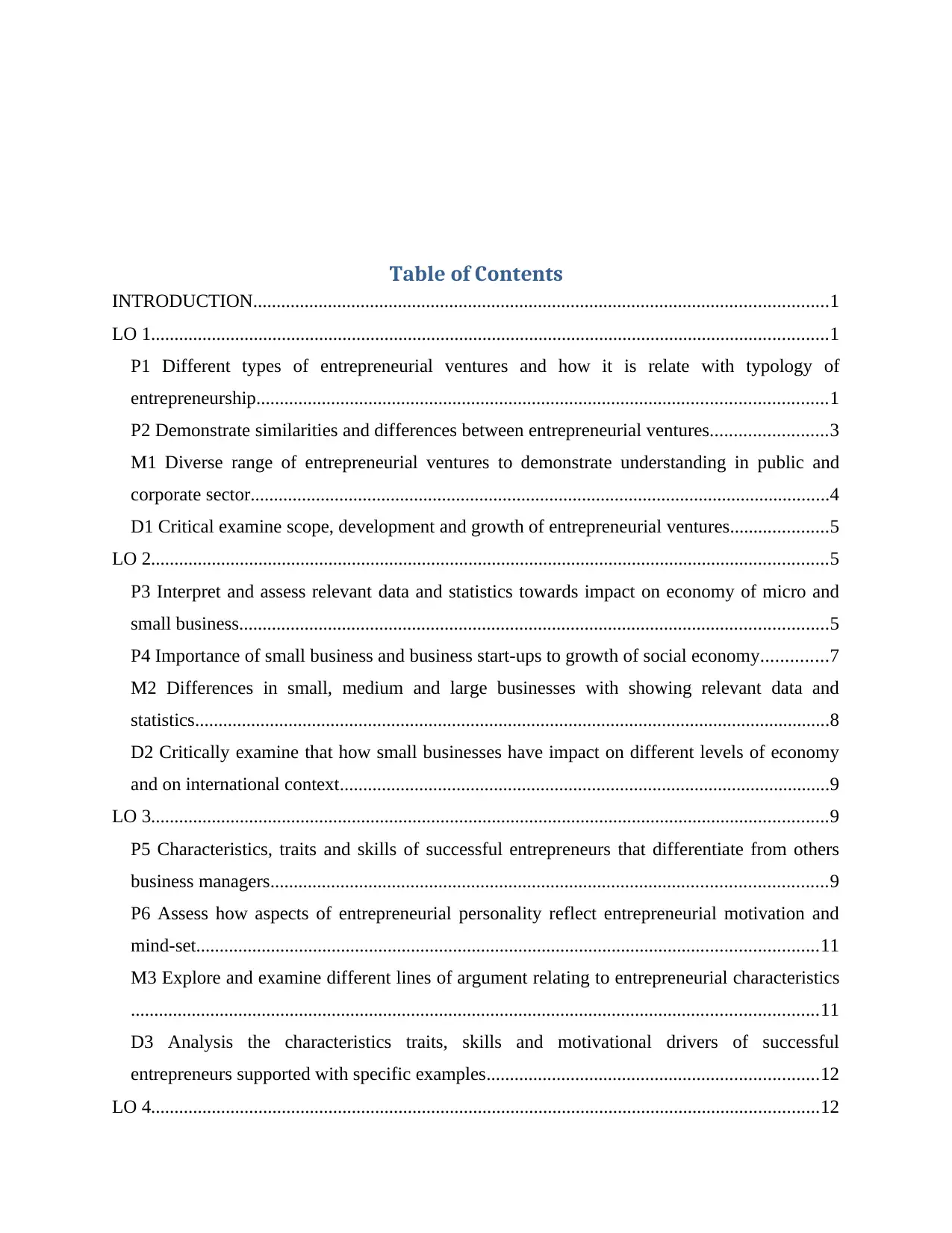
Table of Contents
INTRODUCTION...........................................................................................................................1
LO 1.................................................................................................................................................1
P1 Different types of entrepreneurial ventures and how it is relate with typology of
entrepreneurship..........................................................................................................................1
P2 Demonstrate similarities and differences between entrepreneurial ventures.........................3
M1 Diverse range of entrepreneurial ventures to demonstrate understanding in public and
corporate sector............................................................................................................................4
D1 Critical examine scope, development and growth of entrepreneurial ventures.....................5
LO 2.................................................................................................................................................5
P3 Interpret and assess relevant data and statistics towards impact on economy of micro and
small business..............................................................................................................................5
P4 Importance of small business and business start-ups to growth of social economy..............7
M2 Differences in small, medium and large businesses with showing relevant data and
statistics........................................................................................................................................8
D2 Critically examine that how small businesses have impact on different levels of economy
and on international context.........................................................................................................9
LO 3.................................................................................................................................................9
P5 Characteristics, traits and skills of successful entrepreneurs that differentiate from others
business managers.......................................................................................................................9
P6 Assess how aspects of entrepreneurial personality reflect entrepreneurial motivation and
mind-set.....................................................................................................................................11
M3 Explore and examine different lines of argument relating to entrepreneurial characteristics
...................................................................................................................................................11
D3 Analysis the characteristics traits, skills and motivational drivers of successful
entrepreneurs supported with specific examples.......................................................................12
LO 4...............................................................................................................................................12
INTRODUCTION...........................................................................................................................1
LO 1.................................................................................................................................................1
P1 Different types of entrepreneurial ventures and how it is relate with typology of
entrepreneurship..........................................................................................................................1
P2 Demonstrate similarities and differences between entrepreneurial ventures.........................3
M1 Diverse range of entrepreneurial ventures to demonstrate understanding in public and
corporate sector............................................................................................................................4
D1 Critical examine scope, development and growth of entrepreneurial ventures.....................5
LO 2.................................................................................................................................................5
P3 Interpret and assess relevant data and statistics towards impact on economy of micro and
small business..............................................................................................................................5
P4 Importance of small business and business start-ups to growth of social economy..............7
M2 Differences in small, medium and large businesses with showing relevant data and
statistics........................................................................................................................................8
D2 Critically examine that how small businesses have impact on different levels of economy
and on international context.........................................................................................................9
LO 3.................................................................................................................................................9
P5 Characteristics, traits and skills of successful entrepreneurs that differentiate from others
business managers.......................................................................................................................9
P6 Assess how aspects of entrepreneurial personality reflect entrepreneurial motivation and
mind-set.....................................................................................................................................11
M3 Explore and examine different lines of argument relating to entrepreneurial characteristics
...................................................................................................................................................11
D3 Analysis the characteristics traits, skills and motivational drivers of successful
entrepreneurs supported with specific examples.......................................................................12
LO 4...............................................................................................................................................12

P7 Using relevant examples and examine how background and experience can hinder or foster
entrepreneurship........................................................................................................................12
M4 Analysis the link between entrepreneurial characteristics and influence of person
background and experience to specific successful entrepreneurs..............................................13
D4 Critically evaluate how background and experience influence entrepreneurs both positively
and negatively with comparing and contrasting........................................................................13
CONCLUSION..............................................................................................................................13
REFERENCEES............................................................................................................................15
entrepreneurship........................................................................................................................12
M4 Analysis the link between entrepreneurial characteristics and influence of person
background and experience to specific successful entrepreneurs..............................................13
D4 Critically evaluate how background and experience influence entrepreneurs both positively
and negatively with comparing and contrasting........................................................................13
CONCLUSION..............................................................................................................................13
REFERENCEES............................................................................................................................15
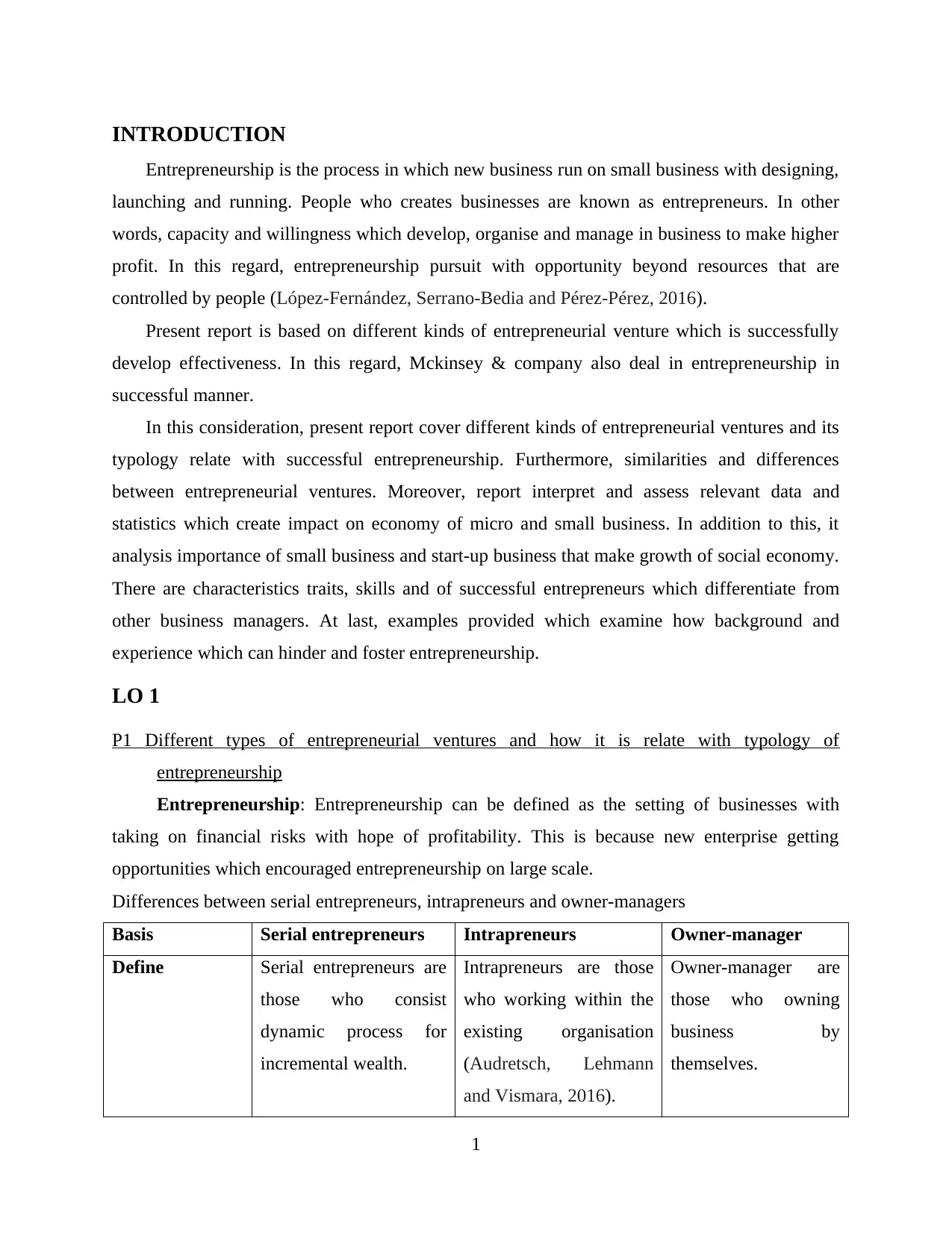
INTRODUCTION
Entrepreneurship is the process in which new business run on small business with designing,
launching and running. People who creates businesses are known as entrepreneurs. In other
words, capacity and willingness which develop, organise and manage in business to make higher
profit. In this regard, entrepreneurship pursuit with opportunity beyond resources that are
controlled by people (López‐Fernández, Serrano‐Bedia and Pérez‐Pérez, 2016).
Present report is based on different kinds of entrepreneurial venture which is successfully
develop effectiveness. In this regard, Mckinsey & company also deal in entrepreneurship in
successful manner.
In this consideration, present report cover different kinds of entrepreneurial ventures and its
typology relate with successful entrepreneurship. Furthermore, similarities and differences
between entrepreneurial ventures. Moreover, report interpret and assess relevant data and
statistics which create impact on economy of micro and small business. In addition to this, it
analysis importance of small business and start-up business that make growth of social economy.
There are characteristics traits, skills and of successful entrepreneurs which differentiate from
other business managers. At last, examples provided which examine how background and
experience which can hinder and foster entrepreneurship.
LO 1
P1 Different types of entrepreneurial ventures and how it is relate with typology of
entrepreneurship
Entrepreneurship: Entrepreneurship can be defined as the setting of businesses with
taking on financial risks with hope of profitability. This is because new enterprise getting
opportunities which encouraged entrepreneurship on large scale.
Differences between serial entrepreneurs, intrapreneurs and owner-managers
Basis Serial entrepreneurs Intrapreneurs Owner-manager
Define Serial entrepreneurs are
those who consist
dynamic process for
incremental wealth.
Intrapreneurs are those
who working within the
existing organisation
(Audretsch, Lehmann
and Vismara, 2016).
Owner-manager are
those who owning
business by
themselves.
1
Entrepreneurship is the process in which new business run on small business with designing,
launching and running. People who creates businesses are known as entrepreneurs. In other
words, capacity and willingness which develop, organise and manage in business to make higher
profit. In this regard, entrepreneurship pursuit with opportunity beyond resources that are
controlled by people (López‐Fernández, Serrano‐Bedia and Pérez‐Pérez, 2016).
Present report is based on different kinds of entrepreneurial venture which is successfully
develop effectiveness. In this regard, Mckinsey & company also deal in entrepreneurship in
successful manner.
In this consideration, present report cover different kinds of entrepreneurial ventures and its
typology relate with successful entrepreneurship. Furthermore, similarities and differences
between entrepreneurial ventures. Moreover, report interpret and assess relevant data and
statistics which create impact on economy of micro and small business. In addition to this, it
analysis importance of small business and start-up business that make growth of social economy.
There are characteristics traits, skills and of successful entrepreneurs which differentiate from
other business managers. At last, examples provided which examine how background and
experience which can hinder and foster entrepreneurship.
LO 1
P1 Different types of entrepreneurial ventures and how it is relate with typology of
entrepreneurship
Entrepreneurship: Entrepreneurship can be defined as the setting of businesses with
taking on financial risks with hope of profitability. This is because new enterprise getting
opportunities which encouraged entrepreneurship on large scale.
Differences between serial entrepreneurs, intrapreneurs and owner-managers
Basis Serial entrepreneurs Intrapreneurs Owner-manager
Define Serial entrepreneurs are
those who consist
dynamic process for
incremental wealth.
Intrapreneurs are those
who working within the
existing organisation
(Audretsch, Lehmann
and Vismara, 2016).
Owner-manager are
those who owning
business by
themselves.
1
Secure Best Marks with AI Grader
Need help grading? Try our AI Grader for instant feedback on your assignments.
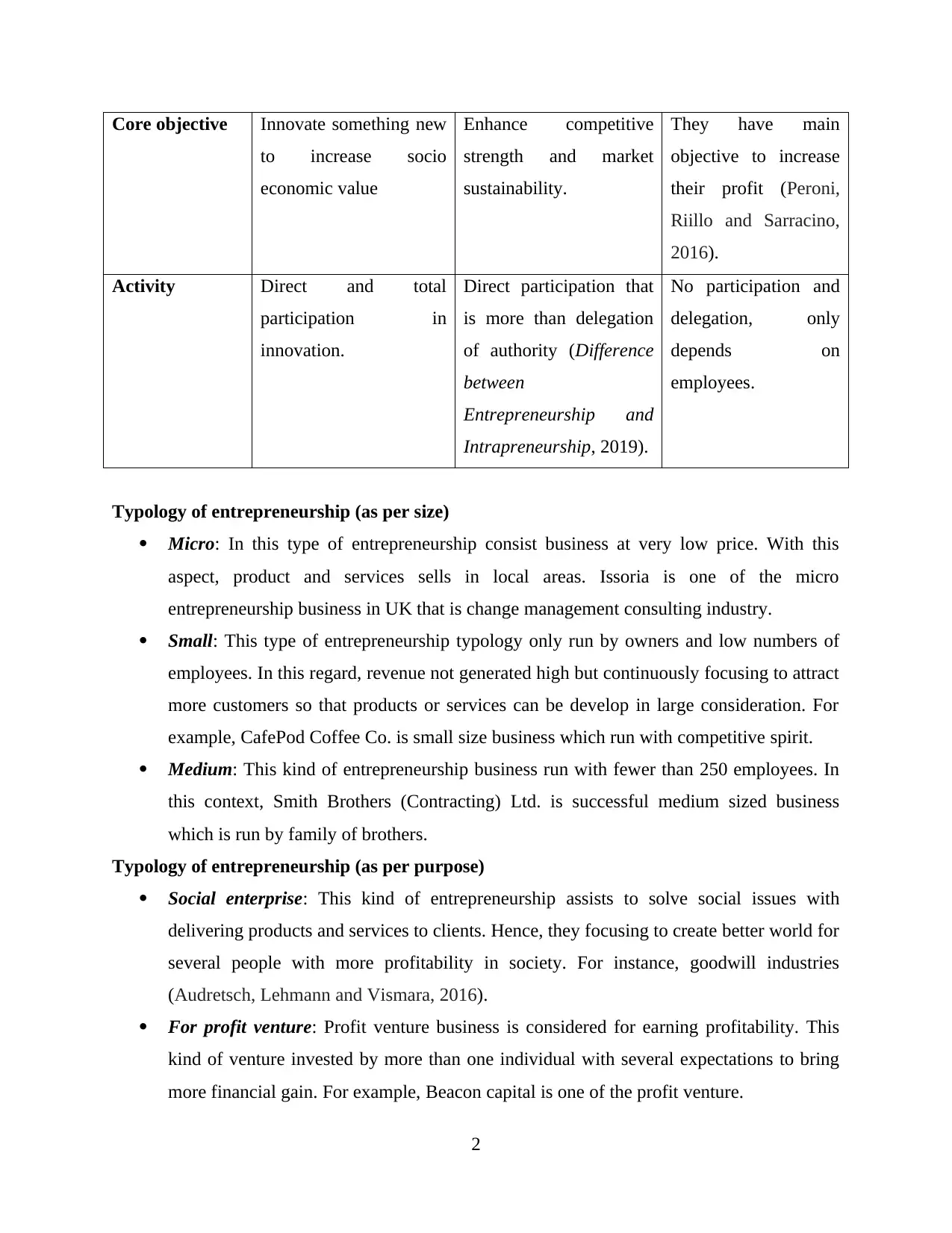
Core objective Innovate something new
to increase socio
economic value
Enhance competitive
strength and market
sustainability.
They have main
objective to increase
their profit (Peroni,
Riillo and Sarracino,
2016).
Activity Direct and total
participation in
innovation.
Direct participation that
is more than delegation
of authority (Difference
between
Entrepreneurship and
Intrapreneurship, 2019).
No participation and
delegation, only
depends on
employees.
Typology of entrepreneurship (as per size)
Micro: In this type of entrepreneurship consist business at very low price. With this
aspect, product and services sells in local areas. Issoria is one of the micro
entrepreneurship business in UK that is change management consulting industry.
Small: This type of entrepreneurship typology only run by owners and low numbers of
employees. In this regard, revenue not generated high but continuously focusing to attract
more customers so that products or services can be develop in large consideration. For
example, CafePod Coffee Co. is small size business which run with competitive spirit.
Medium: This kind of entrepreneurship business run with fewer than 250 employees. In
this context, Smith Brothers (Contracting) Ltd. is successful medium sized business
which is run by family of brothers.
Typology of entrepreneurship (as per purpose)
Social enterprise: This kind of entrepreneurship assists to solve social issues with
delivering products and services to clients. Hence, they focusing to create better world for
several people with more profitability in society. For instance, goodwill industries
(Audretsch, Lehmann and Vismara, 2016).
For profit venture: Profit venture business is considered for earning profitability. This
kind of venture invested by more than one individual with several expectations to bring
more financial gain. For example, Beacon capital is one of the profit venture.
2
to increase socio
economic value
Enhance competitive
strength and market
sustainability.
They have main
objective to increase
their profit (Peroni,
Riillo and Sarracino,
2016).
Activity Direct and total
participation in
innovation.
Direct participation that
is more than delegation
of authority (Difference
between
Entrepreneurship and
Intrapreneurship, 2019).
No participation and
delegation, only
depends on
employees.
Typology of entrepreneurship (as per size)
Micro: In this type of entrepreneurship consist business at very low price. With this
aspect, product and services sells in local areas. Issoria is one of the micro
entrepreneurship business in UK that is change management consulting industry.
Small: This type of entrepreneurship typology only run by owners and low numbers of
employees. In this regard, revenue not generated high but continuously focusing to attract
more customers so that products or services can be develop in large consideration. For
example, CafePod Coffee Co. is small size business which run with competitive spirit.
Medium: This kind of entrepreneurship business run with fewer than 250 employees. In
this context, Smith Brothers (Contracting) Ltd. is successful medium sized business
which is run by family of brothers.
Typology of entrepreneurship (as per purpose)
Social enterprise: This kind of entrepreneurship assists to solve social issues with
delivering products and services to clients. Hence, they focusing to create better world for
several people with more profitability in society. For instance, goodwill industries
(Audretsch, Lehmann and Vismara, 2016).
For profit venture: Profit venture business is considered for earning profitability. This
kind of venture invested by more than one individual with several expectations to bring
more financial gain. For example, Beacon capital is one of the profit venture.
2
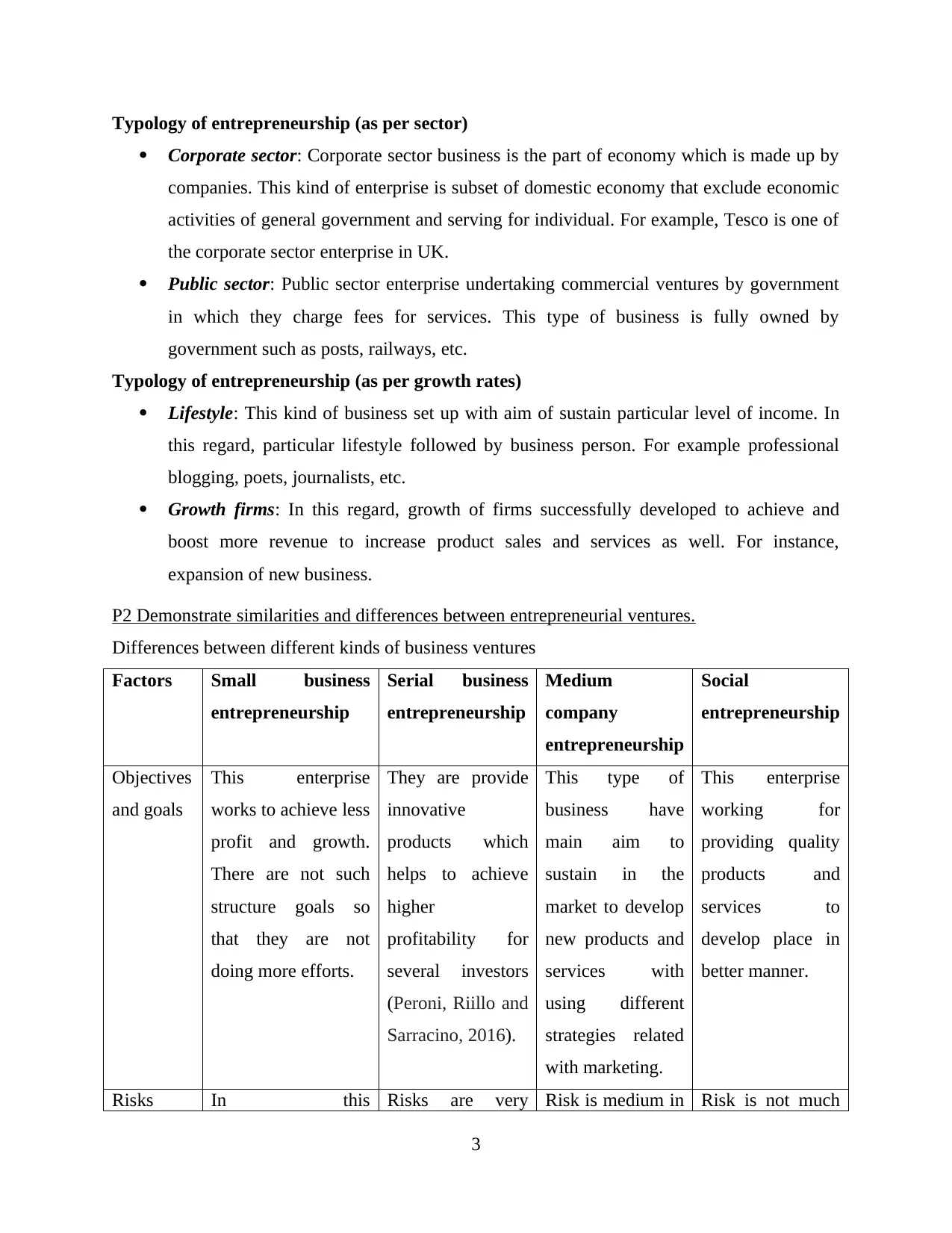
Typology of entrepreneurship (as per sector)
Corporate sector: Corporate sector business is the part of economy which is made up by
companies. This kind of enterprise is subset of domestic economy that exclude economic
activities of general government and serving for individual. For example, Tesco is one of
the corporate sector enterprise in UK.
Public sector: Public sector enterprise undertaking commercial ventures by government
in which they charge fees for services. This type of business is fully owned by
government such as posts, railways, etc.
Typology of entrepreneurship (as per growth rates)
Lifestyle: This kind of business set up with aim of sustain particular level of income. In
this regard, particular lifestyle followed by business person. For example professional
blogging, poets, journalists, etc.
Growth firms: In this regard, growth of firms successfully developed to achieve and
boost more revenue to increase product sales and services as well. For instance,
expansion of new business.
P2 Demonstrate similarities and differences between entrepreneurial ventures.
Differences between different kinds of business ventures
Factors Small business
entrepreneurship
Serial business
entrepreneurship
Medium
company
entrepreneurship
Social
entrepreneurship
Objectives
and goals
This enterprise
works to achieve less
profit and growth.
There are not such
structure goals so
that they are not
doing more efforts.
They are provide
innovative
products which
helps to achieve
higher
profitability for
several investors
(Peroni, Riillo and
Sarracino, 2016).
This type of
business have
main aim to
sustain in the
market to develop
new products and
services with
using different
strategies related
with marketing.
This enterprise
working for
providing quality
products and
services to
develop place in
better manner.
Risks In this Risks are very Risk is medium in Risk is not much
3
Corporate sector: Corporate sector business is the part of economy which is made up by
companies. This kind of enterprise is subset of domestic economy that exclude economic
activities of general government and serving for individual. For example, Tesco is one of
the corporate sector enterprise in UK.
Public sector: Public sector enterprise undertaking commercial ventures by government
in which they charge fees for services. This type of business is fully owned by
government such as posts, railways, etc.
Typology of entrepreneurship (as per growth rates)
Lifestyle: This kind of business set up with aim of sustain particular level of income. In
this regard, particular lifestyle followed by business person. For example professional
blogging, poets, journalists, etc.
Growth firms: In this regard, growth of firms successfully developed to achieve and
boost more revenue to increase product sales and services as well. For instance,
expansion of new business.
P2 Demonstrate similarities and differences between entrepreneurial ventures.
Differences between different kinds of business ventures
Factors Small business
entrepreneurship
Serial business
entrepreneurship
Medium
company
entrepreneurship
Social
entrepreneurship
Objectives
and goals
This enterprise
works to achieve less
profit and growth.
There are not such
structure goals so
that they are not
doing more efforts.
They are provide
innovative
products which
helps to achieve
higher
profitability for
several investors
(Peroni, Riillo and
Sarracino, 2016).
This type of
business have
main aim to
sustain in the
market to develop
new products and
services with
using different
strategies related
with marketing.
This enterprise
working for
providing quality
products and
services to
develop place in
better manner.
Risks In this Risks are very Risk is medium in Risk is not much
3
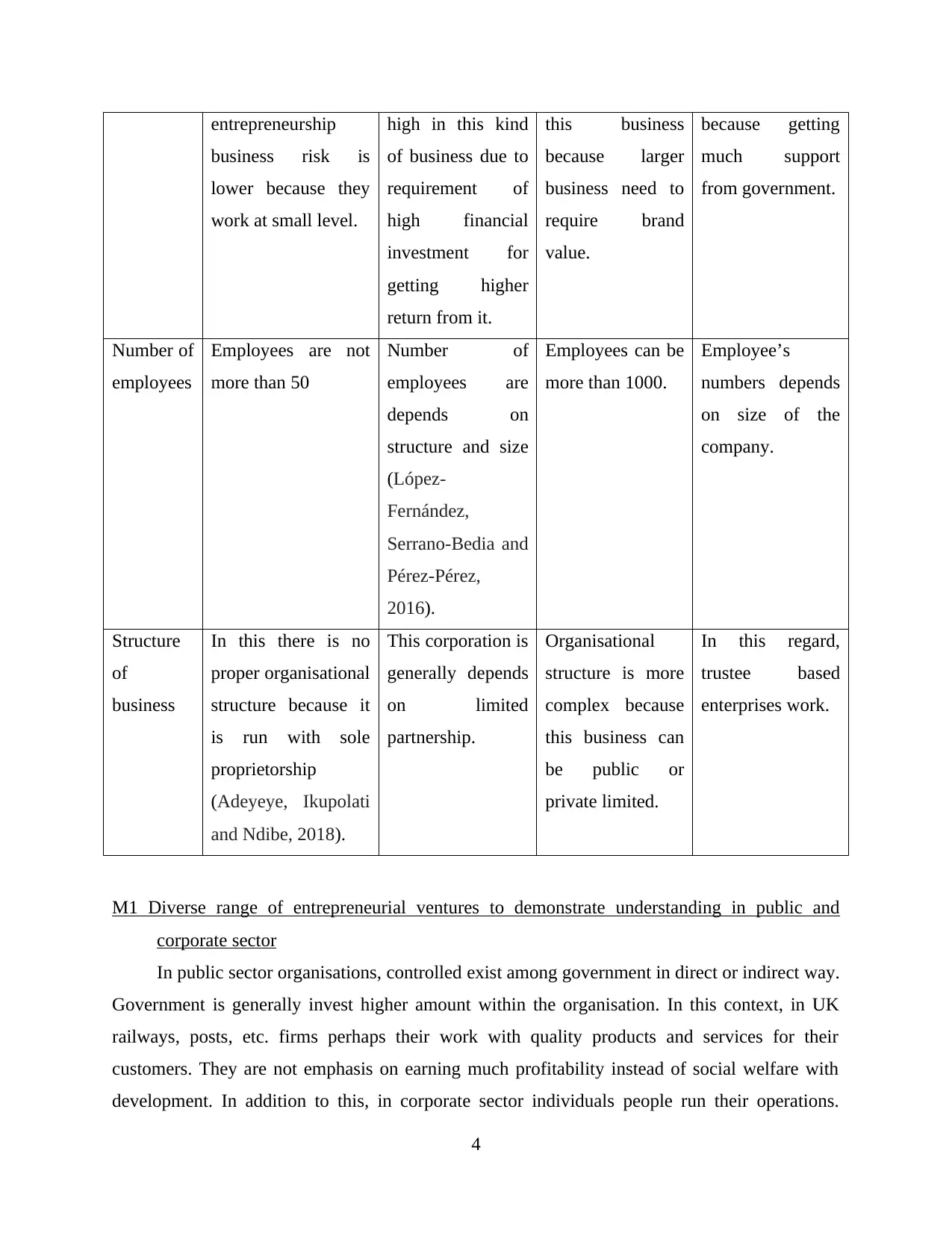
entrepreneurship
business risk is
lower because they
work at small level.
high in this kind
of business due to
requirement of
high financial
investment for
getting higher
return from it.
this business
because larger
business need to
require brand
value.
because getting
much support
from government.
Number of
employees
Employees are not
more than 50
Number of
employees are
depends on
structure and size
(López‐
Fernández,
Serrano‐Bedia and
Pérez‐Pérez,
2016).
Employees can be
more than 1000.
Employee’s
numbers depends
on size of the
company.
Structure
of
business
In this there is no
proper organisational
structure because it
is run with sole
proprietorship
(Adeyeye, Ikupolati
and Ndibe, 2018).
This corporation is
generally depends
on limited
partnership.
Organisational
structure is more
complex because
this business can
be public or
private limited.
In this regard,
trustee based
enterprises work.
M1 Diverse range of entrepreneurial ventures to demonstrate understanding in public and
corporate sector
In public sector organisations, controlled exist among government in direct or indirect way.
Government is generally invest higher amount within the organisation. In this context, in UK
railways, posts, etc. firms perhaps their work with quality products and services for their
customers. They are not emphasis on earning much profitability instead of social welfare with
development. In addition to this, in corporate sector individuals people run their operations.
4
business risk is
lower because they
work at small level.
high in this kind
of business due to
requirement of
high financial
investment for
getting higher
return from it.
this business
because larger
business need to
require brand
value.
because getting
much support
from government.
Number of
employees
Employees are not
more than 50
Number of
employees are
depends on
structure and size
(López‐
Fernández,
Serrano‐Bedia and
Pérez‐Pérez,
2016).
Employees can be
more than 1000.
Employee’s
numbers depends
on size of the
company.
Structure
of
business
In this there is no
proper organisational
structure because it
is run with sole
proprietorship
(Adeyeye, Ikupolati
and Ndibe, 2018).
This corporation is
generally depends
on limited
partnership.
Organisational
structure is more
complex because
this business can
be public or
private limited.
In this regard,
trustee based
enterprises work.
M1 Diverse range of entrepreneurial ventures to demonstrate understanding in public and
corporate sector
In public sector organisations, controlled exist among government in direct or indirect way.
Government is generally invest higher amount within the organisation. In this context, in UK
railways, posts, etc. firms perhaps their work with quality products and services for their
customers. They are not emphasis on earning much profitability instead of social welfare with
development. In addition to this, in corporate sector individuals people run their operations.
4
Paraphrase This Document
Need a fresh take? Get an instant paraphrase of this document with our AI Paraphraser
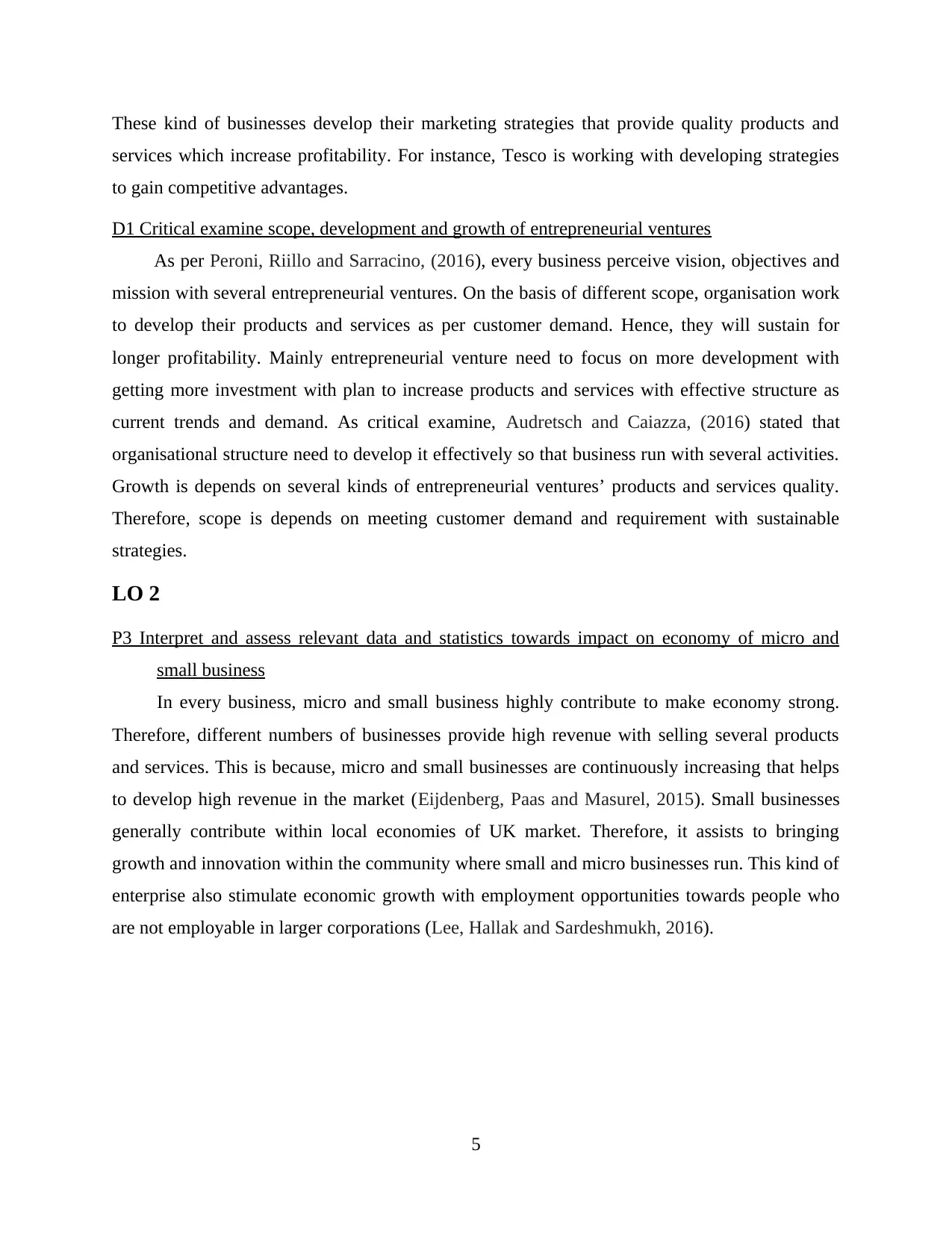
These kind of businesses develop their marketing strategies that provide quality products and
services which increase profitability. For instance, Tesco is working with developing strategies
to gain competitive advantages.
D1 Critical examine scope, development and growth of entrepreneurial ventures
As per Peroni, Riillo and Sarracino, (2016), every business perceive vision, objectives and
mission with several entrepreneurial ventures. On the basis of different scope, organisation work
to develop their products and services as per customer demand. Hence, they will sustain for
longer profitability. Mainly entrepreneurial venture need to focus on more development with
getting more investment with plan to increase products and services with effective structure as
current trends and demand. As critical examine, Audretsch and Caiazza, (2016) stated that
organisational structure need to develop it effectively so that business run with several activities.
Growth is depends on several kinds of entrepreneurial ventures’ products and services quality.
Therefore, scope is depends on meeting customer demand and requirement with sustainable
strategies.
LO 2
P3 Interpret and assess relevant data and statistics towards impact on economy of micro and
small business
In every business, micro and small business highly contribute to make economy strong.
Therefore, different numbers of businesses provide high revenue with selling several products
and services. This is because, micro and small businesses are continuously increasing that helps
to develop high revenue in the market (Eijdenberg, Paas and Masurel, 2015). Small businesses
generally contribute within local economies of UK market. Therefore, it assists to bringing
growth and innovation within the community where small and micro businesses run. This kind of
enterprise also stimulate economic growth with employment opportunities towards people who
are not employable in larger corporations (Lee, Hallak and Sardeshmukh, 2016).
5
services which increase profitability. For instance, Tesco is working with developing strategies
to gain competitive advantages.
D1 Critical examine scope, development and growth of entrepreneurial ventures
As per Peroni, Riillo and Sarracino, (2016), every business perceive vision, objectives and
mission with several entrepreneurial ventures. On the basis of different scope, organisation work
to develop their products and services as per customer demand. Hence, they will sustain for
longer profitability. Mainly entrepreneurial venture need to focus on more development with
getting more investment with plan to increase products and services with effective structure as
current trends and demand. As critical examine, Audretsch and Caiazza, (2016) stated that
organisational structure need to develop it effectively so that business run with several activities.
Growth is depends on several kinds of entrepreneurial ventures’ products and services quality.
Therefore, scope is depends on meeting customer demand and requirement with sustainable
strategies.
LO 2
P3 Interpret and assess relevant data and statistics towards impact on economy of micro and
small business
In every business, micro and small business highly contribute to make economy strong.
Therefore, different numbers of businesses provide high revenue with selling several products
and services. This is because, micro and small businesses are continuously increasing that helps
to develop high revenue in the market (Eijdenberg, Paas and Masurel, 2015). Small businesses
generally contribute within local economies of UK market. Therefore, it assists to bringing
growth and innovation within the community where small and micro businesses run. This kind of
enterprise also stimulate economic growth with employment opportunities towards people who
are not employable in larger corporations (Lee, Hallak and Sardeshmukh, 2016).
5
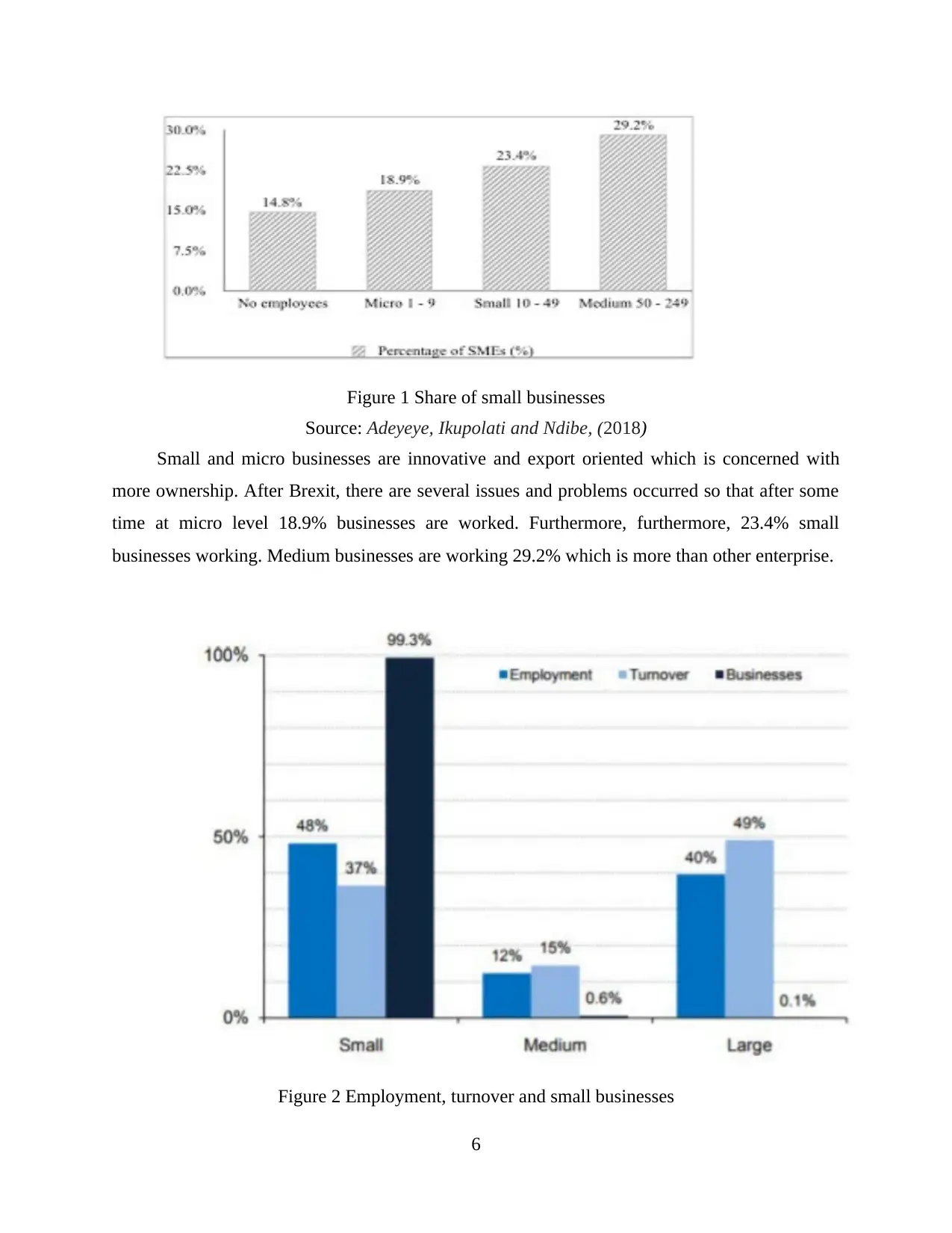
Figure 1 Share of small businesses
Source: Adeyeye, Ikupolati and Ndibe, (2018)
Small and micro businesses are innovative and export oriented which is concerned with
more ownership. After Brexit, there are several issues and problems occurred so that after some
time at micro level 18.9% businesses are worked. Furthermore, furthermore, 23.4% small
businesses working. Medium businesses are working 29.2% which is more than other enterprise.
Figure 2 Employment, turnover and small businesses
6
Source: Adeyeye, Ikupolati and Ndibe, (2018)
Small and micro businesses are innovative and export oriented which is concerned with
more ownership. After Brexit, there are several issues and problems occurred so that after some
time at micro level 18.9% businesses are worked. Furthermore, furthermore, 23.4% small
businesses working. Medium businesses are working 29.2% which is more than other enterprise.
Figure 2 Employment, turnover and small businesses
6
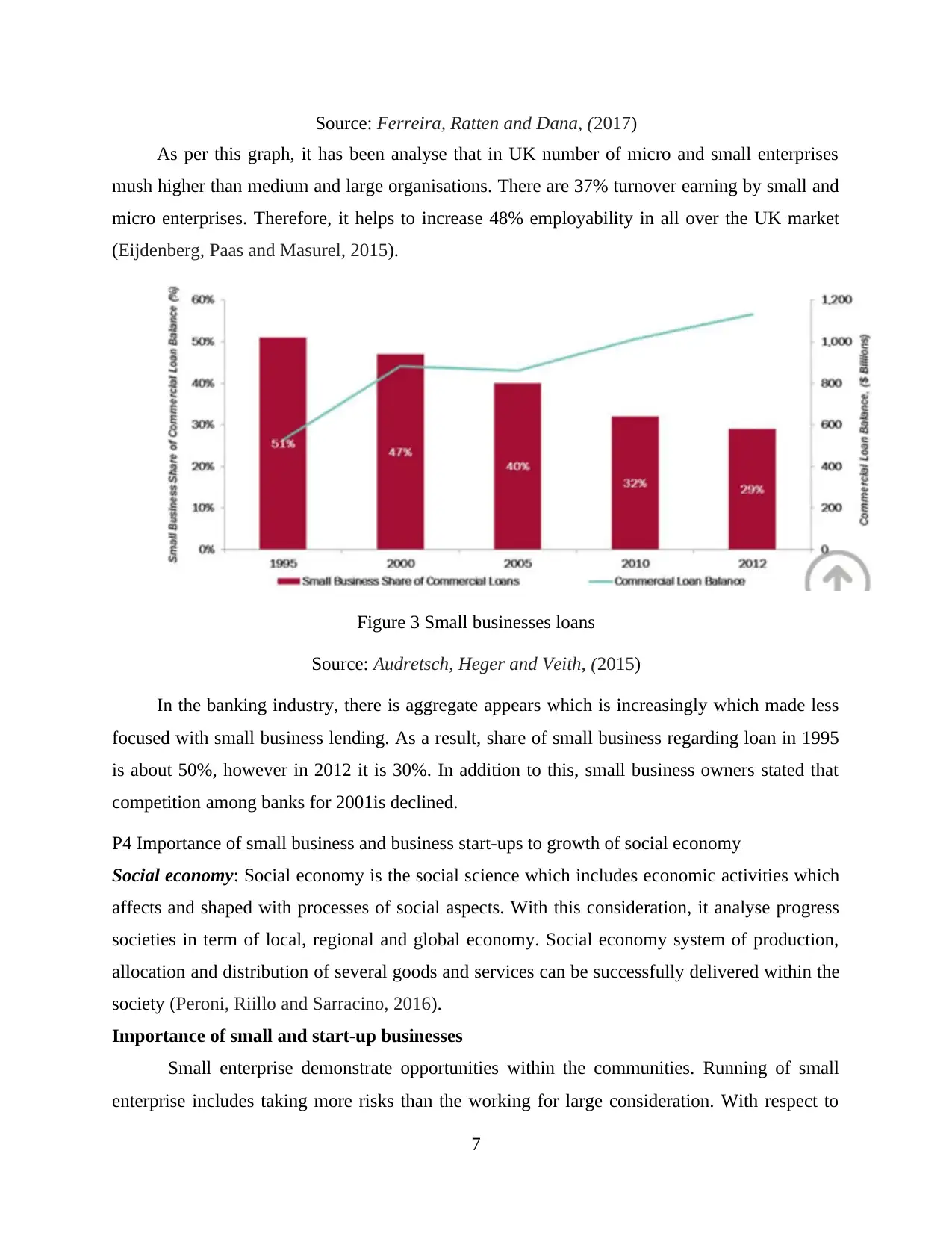
Source: Ferreira, Ratten and Dana, (2017)
As per this graph, it has been analyse that in UK number of micro and small enterprises
mush higher than medium and large organisations. There are 37% turnover earning by small and
micro enterprises. Therefore, it helps to increase 48% employability in all over the UK market
(Eijdenberg, Paas and Masurel, 2015).
Figure 3 Small businesses loans
Source: Audretsch, Heger and Veith, (2015)
In the banking industry, there is aggregate appears which is increasingly which made less
focused with small business lending. As a result, share of small business regarding loan in 1995
is about 50%, however in 2012 it is 30%. In addition to this, small business owners stated that
competition among banks for 2001is declined.
P4 Importance of small business and business start-ups to growth of social economy
Social economy: Social economy is the social science which includes economic activities which
affects and shaped with processes of social aspects. With this consideration, it analyse progress
societies in term of local, regional and global economy. Social economy system of production,
allocation and distribution of several goods and services can be successfully delivered within the
society (Peroni, Riillo and Sarracino, 2016).
Importance of small and start-up businesses
Small enterprise demonstrate opportunities within the communities. Running of small
enterprise includes taking more risks than the working for large consideration. With respect to
7
As per this graph, it has been analyse that in UK number of micro and small enterprises
mush higher than medium and large organisations. There are 37% turnover earning by small and
micro enterprises. Therefore, it helps to increase 48% employability in all over the UK market
(Eijdenberg, Paas and Masurel, 2015).
Figure 3 Small businesses loans
Source: Audretsch, Heger and Veith, (2015)
In the banking industry, there is aggregate appears which is increasingly which made less
focused with small business lending. As a result, share of small business regarding loan in 1995
is about 50%, however in 2012 it is 30%. In addition to this, small business owners stated that
competition among banks for 2001is declined.
P4 Importance of small business and business start-ups to growth of social economy
Social economy: Social economy is the social science which includes economic activities which
affects and shaped with processes of social aspects. With this consideration, it analyse progress
societies in term of local, regional and global economy. Social economy system of production,
allocation and distribution of several goods and services can be successfully delivered within the
society (Peroni, Riillo and Sarracino, 2016).
Importance of small and start-up businesses
Small enterprise demonstrate opportunities within the communities. Running of small
enterprise includes taking more risks than the working for large consideration. With respect to
7
Secure Best Marks with AI Grader
Need help grading? Try our AI Grader for instant feedback on your assignments.
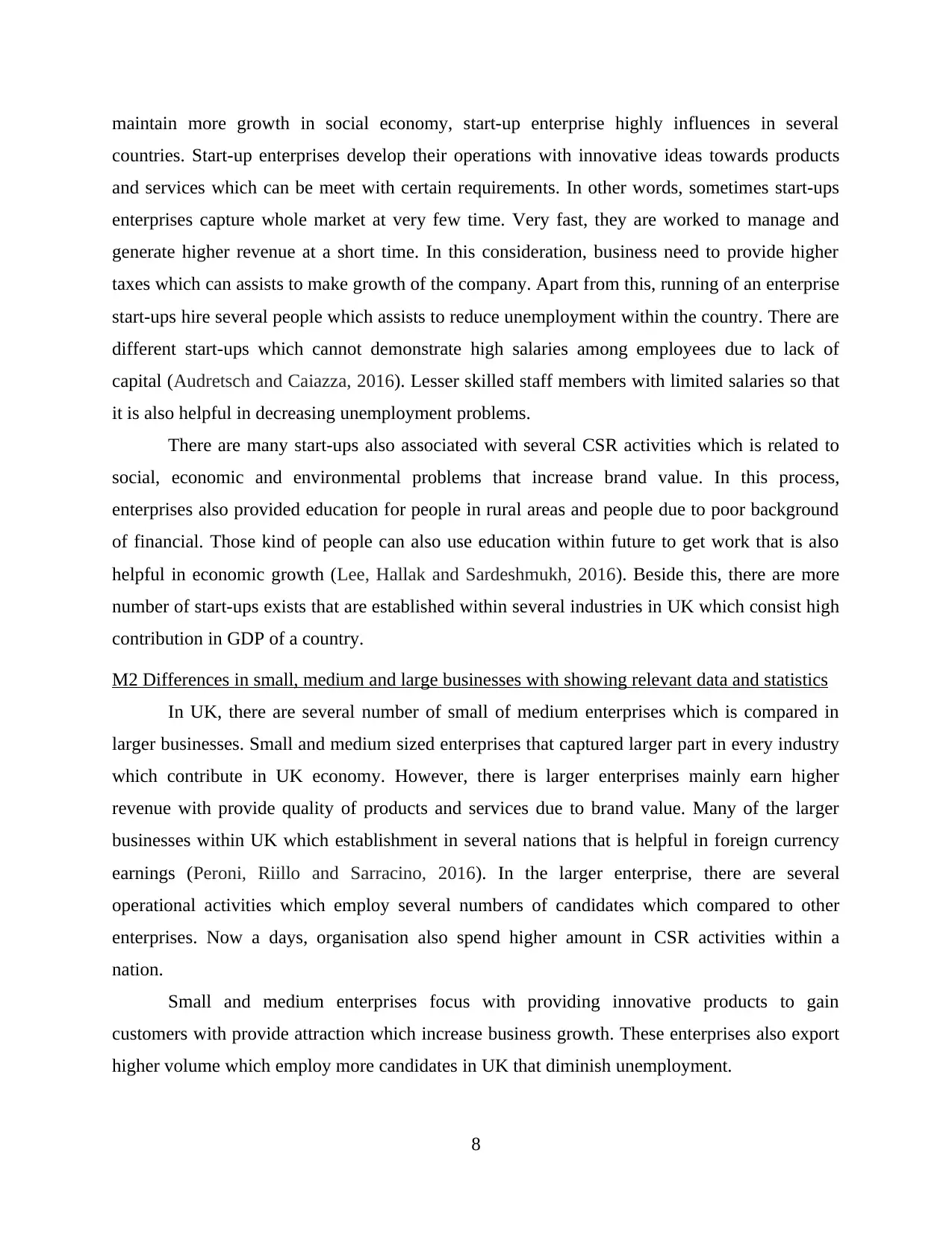
maintain more growth in social economy, start-up enterprise highly influences in several
countries. Start-up enterprises develop their operations with innovative ideas towards products
and services which can be meet with certain requirements. In other words, sometimes start-ups
enterprises capture whole market at very few time. Very fast, they are worked to manage and
generate higher revenue at a short time. In this consideration, business need to provide higher
taxes which can assists to make growth of the company. Apart from this, running of an enterprise
start-ups hire several people which assists to reduce unemployment within the country. There are
different start-ups which cannot demonstrate high salaries among employees due to lack of
capital (Audretsch and Caiazza, 2016). Lesser skilled staff members with limited salaries so that
it is also helpful in decreasing unemployment problems.
There are many start-ups also associated with several CSR activities which is related to
social, economic and environmental problems that increase brand value. In this process,
enterprises also provided education for people in rural areas and people due to poor background
of financial. Those kind of people can also use education within future to get work that is also
helpful in economic growth (Lee, Hallak and Sardeshmukh, 2016). Beside this, there are more
number of start-ups exists that are established within several industries in UK which consist high
contribution in GDP of a country.
M2 Differences in small, medium and large businesses with showing relevant data and statistics
In UK, there are several number of small of medium enterprises which is compared in
larger businesses. Small and medium sized enterprises that captured larger part in every industry
which contribute in UK economy. However, there is larger enterprises mainly earn higher
revenue with provide quality of products and services due to brand value. Many of the larger
businesses within UK which establishment in several nations that is helpful in foreign currency
earnings (Peroni, Riillo and Sarracino, 2016). In the larger enterprise, there are several
operational activities which employ several numbers of candidates which compared to other
enterprises. Now a days, organisation also spend higher amount in CSR activities within a
nation.
Small and medium enterprises focus with providing innovative products to gain
customers with provide attraction which increase business growth. These enterprises also export
higher volume which employ more candidates in UK that diminish unemployment.
8
countries. Start-up enterprises develop their operations with innovative ideas towards products
and services which can be meet with certain requirements. In other words, sometimes start-ups
enterprises capture whole market at very few time. Very fast, they are worked to manage and
generate higher revenue at a short time. In this consideration, business need to provide higher
taxes which can assists to make growth of the company. Apart from this, running of an enterprise
start-ups hire several people which assists to reduce unemployment within the country. There are
different start-ups which cannot demonstrate high salaries among employees due to lack of
capital (Audretsch and Caiazza, 2016). Lesser skilled staff members with limited salaries so that
it is also helpful in decreasing unemployment problems.
There are many start-ups also associated with several CSR activities which is related to
social, economic and environmental problems that increase brand value. In this process,
enterprises also provided education for people in rural areas and people due to poor background
of financial. Those kind of people can also use education within future to get work that is also
helpful in economic growth (Lee, Hallak and Sardeshmukh, 2016). Beside this, there are more
number of start-ups exists that are established within several industries in UK which consist high
contribution in GDP of a country.
M2 Differences in small, medium and large businesses with showing relevant data and statistics
In UK, there are several number of small of medium enterprises which is compared in
larger businesses. Small and medium sized enterprises that captured larger part in every industry
which contribute in UK economy. However, there is larger enterprises mainly earn higher
revenue with provide quality of products and services due to brand value. Many of the larger
businesses within UK which establishment in several nations that is helpful in foreign currency
earnings (Peroni, Riillo and Sarracino, 2016). In the larger enterprise, there are several
operational activities which employ several numbers of candidates which compared to other
enterprises. Now a days, organisation also spend higher amount in CSR activities within a
nation.
Small and medium enterprises focus with providing innovative products to gain
customers with provide attraction which increase business growth. These enterprises also export
higher volume which employ more candidates in UK that diminish unemployment.
8
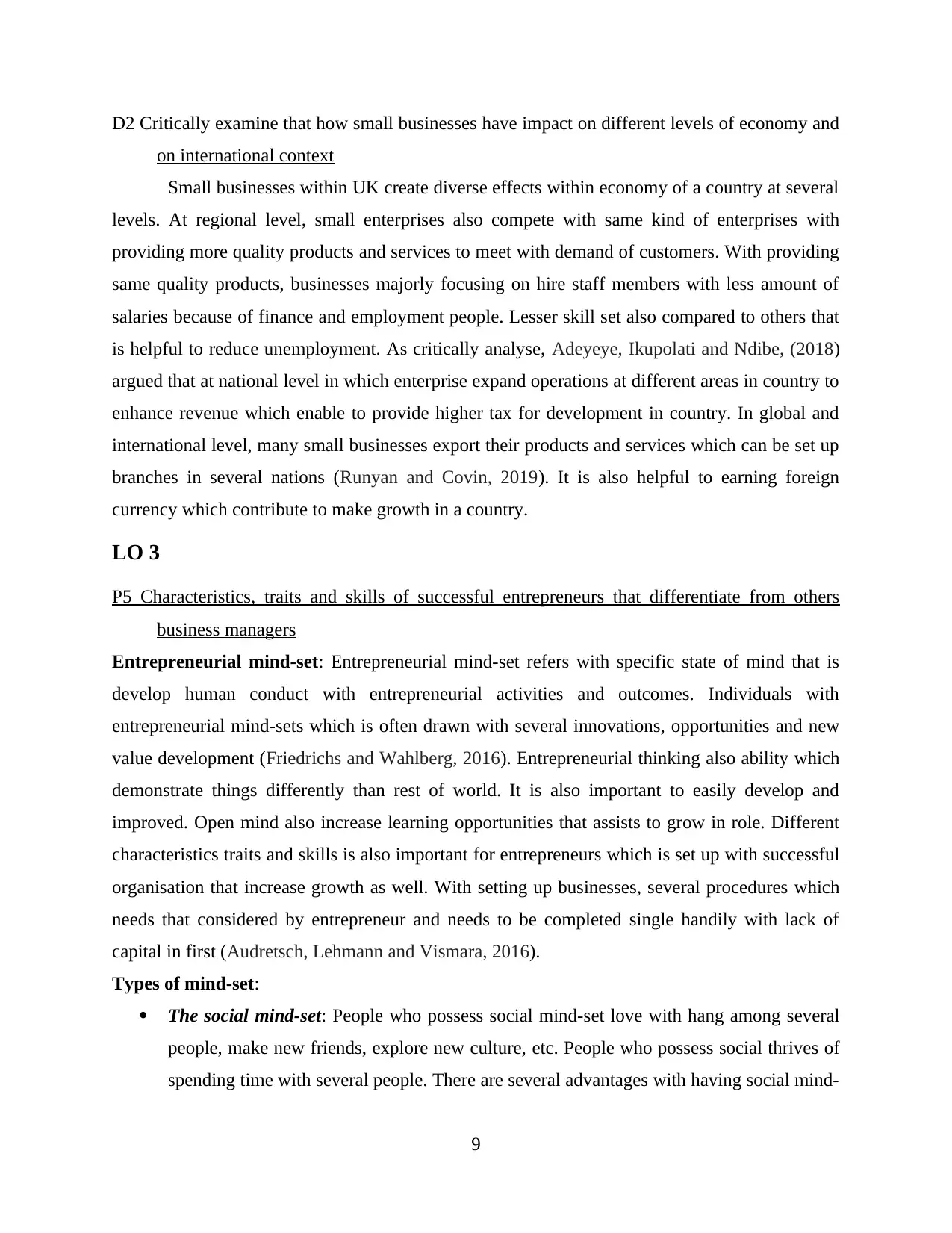
D2 Critically examine that how small businesses have impact on different levels of economy and
on international context
Small businesses within UK create diverse effects within economy of a country at several
levels. At regional level, small enterprises also compete with same kind of enterprises with
providing more quality products and services to meet with demand of customers. With providing
same quality products, businesses majorly focusing on hire staff members with less amount of
salaries because of finance and employment people. Lesser skill set also compared to others that
is helpful to reduce unemployment. As critically analyse, Adeyeye, Ikupolati and Ndibe, (2018)
argued that at national level in which enterprise expand operations at different areas in country to
enhance revenue which enable to provide higher tax for development in country. In global and
international level, many small businesses export their products and services which can be set up
branches in several nations (Runyan and Covin, 2019). It is also helpful to earning foreign
currency which contribute to make growth in a country.
LO 3
P5 Characteristics, traits and skills of successful entrepreneurs that differentiate from others
business managers
Entrepreneurial mind-set: Entrepreneurial mind-set refers with specific state of mind that is
develop human conduct with entrepreneurial activities and outcomes. Individuals with
entrepreneurial mind-sets which is often drawn with several innovations, opportunities and new
value development (Friedrichs and Wahlberg, 2016). Entrepreneurial thinking also ability which
demonstrate things differently than rest of world. It is also important to easily develop and
improved. Open mind also increase learning opportunities that assists to grow in role. Different
characteristics traits and skills is also important for entrepreneurs which is set up with successful
organisation that increase growth as well. With setting up businesses, several procedures which
needs that considered by entrepreneur and needs to be completed single handily with lack of
capital in first (Audretsch, Lehmann and Vismara, 2016).
Types of mind-set:
The social mind-set: People who possess social mind-set love with hang among several
people, make new friends, explore new culture, etc. People who possess social thrives of
spending time with several people. There are several advantages with having social mind-
9
on international context
Small businesses within UK create diverse effects within economy of a country at several
levels. At regional level, small enterprises also compete with same kind of enterprises with
providing more quality products and services to meet with demand of customers. With providing
same quality products, businesses majorly focusing on hire staff members with less amount of
salaries because of finance and employment people. Lesser skill set also compared to others that
is helpful to reduce unemployment. As critically analyse, Adeyeye, Ikupolati and Ndibe, (2018)
argued that at national level in which enterprise expand operations at different areas in country to
enhance revenue which enable to provide higher tax for development in country. In global and
international level, many small businesses export their products and services which can be set up
branches in several nations (Runyan and Covin, 2019). It is also helpful to earning foreign
currency which contribute to make growth in a country.
LO 3
P5 Characteristics, traits and skills of successful entrepreneurs that differentiate from others
business managers
Entrepreneurial mind-set: Entrepreneurial mind-set refers with specific state of mind that is
develop human conduct with entrepreneurial activities and outcomes. Individuals with
entrepreneurial mind-sets which is often drawn with several innovations, opportunities and new
value development (Friedrichs and Wahlberg, 2016). Entrepreneurial thinking also ability which
demonstrate things differently than rest of world. It is also important to easily develop and
improved. Open mind also increase learning opportunities that assists to grow in role. Different
characteristics traits and skills is also important for entrepreneurs which is set up with successful
organisation that increase growth as well. With setting up businesses, several procedures which
needs that considered by entrepreneur and needs to be completed single handily with lack of
capital in first (Audretsch, Lehmann and Vismara, 2016).
Types of mind-set:
The social mind-set: People who possess social mind-set love with hang among several
people, make new friends, explore new culture, etc. People who possess social thrives of
spending time with several people. There are several advantages with having social mind-
9
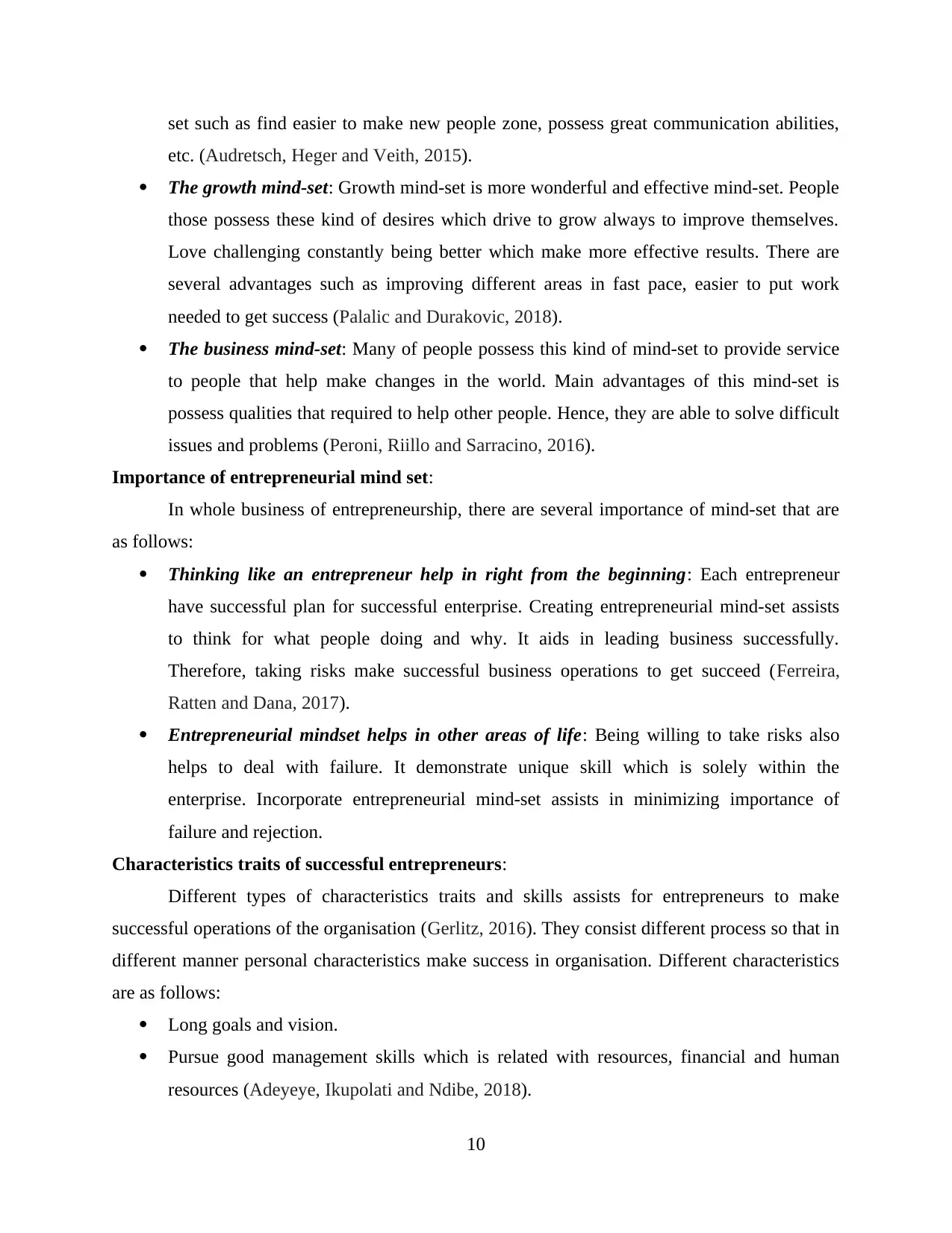
set such as find easier to make new people zone, possess great communication abilities,
etc. (Audretsch, Heger and Veith, 2015).
The growth mind-set: Growth mind-set is more wonderful and effective mind-set. People
those possess these kind of desires which drive to grow always to improve themselves.
Love challenging constantly being better which make more effective results. There are
several advantages such as improving different areas in fast pace, easier to put work
needed to get success (Palalic and Durakovic, 2018).
The business mind-set: Many of people possess this kind of mind-set to provide service
to people that help make changes in the world. Main advantages of this mind-set is
possess qualities that required to help other people. Hence, they are able to solve difficult
issues and problems (Peroni, Riillo and Sarracino, 2016).
Importance of entrepreneurial mind set:
In whole business of entrepreneurship, there are several importance of mind-set that are
as follows:
Thinking like an entrepreneur help in right from the beginning: Each entrepreneur
have successful plan for successful enterprise. Creating entrepreneurial mind-set assists
to think for what people doing and why. It aids in leading business successfully.
Therefore, taking risks make successful business operations to get succeed (Ferreira,
Ratten and Dana, 2017).
Entrepreneurial mindset helps in other areas of life: Being willing to take risks also
helps to deal with failure. It demonstrate unique skill which is solely within the
enterprise. Incorporate entrepreneurial mind-set assists in minimizing importance of
failure and rejection.
Characteristics traits of successful entrepreneurs:
Different types of characteristics traits and skills assists for entrepreneurs to make
successful operations of the organisation (Gerlitz, 2016). They consist different process so that in
different manner personal characteristics make success in organisation. Different characteristics
are as follows:
Long goals and vision.
Pursue good management skills which is related with resources, financial and human
resources (Adeyeye, Ikupolati and Ndibe, 2018).
10
etc. (Audretsch, Heger and Veith, 2015).
The growth mind-set: Growth mind-set is more wonderful and effective mind-set. People
those possess these kind of desires which drive to grow always to improve themselves.
Love challenging constantly being better which make more effective results. There are
several advantages such as improving different areas in fast pace, easier to put work
needed to get success (Palalic and Durakovic, 2018).
The business mind-set: Many of people possess this kind of mind-set to provide service
to people that help make changes in the world. Main advantages of this mind-set is
possess qualities that required to help other people. Hence, they are able to solve difficult
issues and problems (Peroni, Riillo and Sarracino, 2016).
Importance of entrepreneurial mind set:
In whole business of entrepreneurship, there are several importance of mind-set that are
as follows:
Thinking like an entrepreneur help in right from the beginning: Each entrepreneur
have successful plan for successful enterprise. Creating entrepreneurial mind-set assists
to think for what people doing and why. It aids in leading business successfully.
Therefore, taking risks make successful business operations to get succeed (Ferreira,
Ratten and Dana, 2017).
Entrepreneurial mindset helps in other areas of life: Being willing to take risks also
helps to deal with failure. It demonstrate unique skill which is solely within the
enterprise. Incorporate entrepreneurial mind-set assists in minimizing importance of
failure and rejection.
Characteristics traits of successful entrepreneurs:
Different types of characteristics traits and skills assists for entrepreneurs to make
successful operations of the organisation (Gerlitz, 2016). They consist different process so that in
different manner personal characteristics make success in organisation. Different characteristics
are as follows:
Long goals and vision.
Pursue good management skills which is related with resources, financial and human
resources (Adeyeye, Ikupolati and Ndibe, 2018).
10
Paraphrase This Document
Need a fresh take? Get an instant paraphrase of this document with our AI Paraphraser
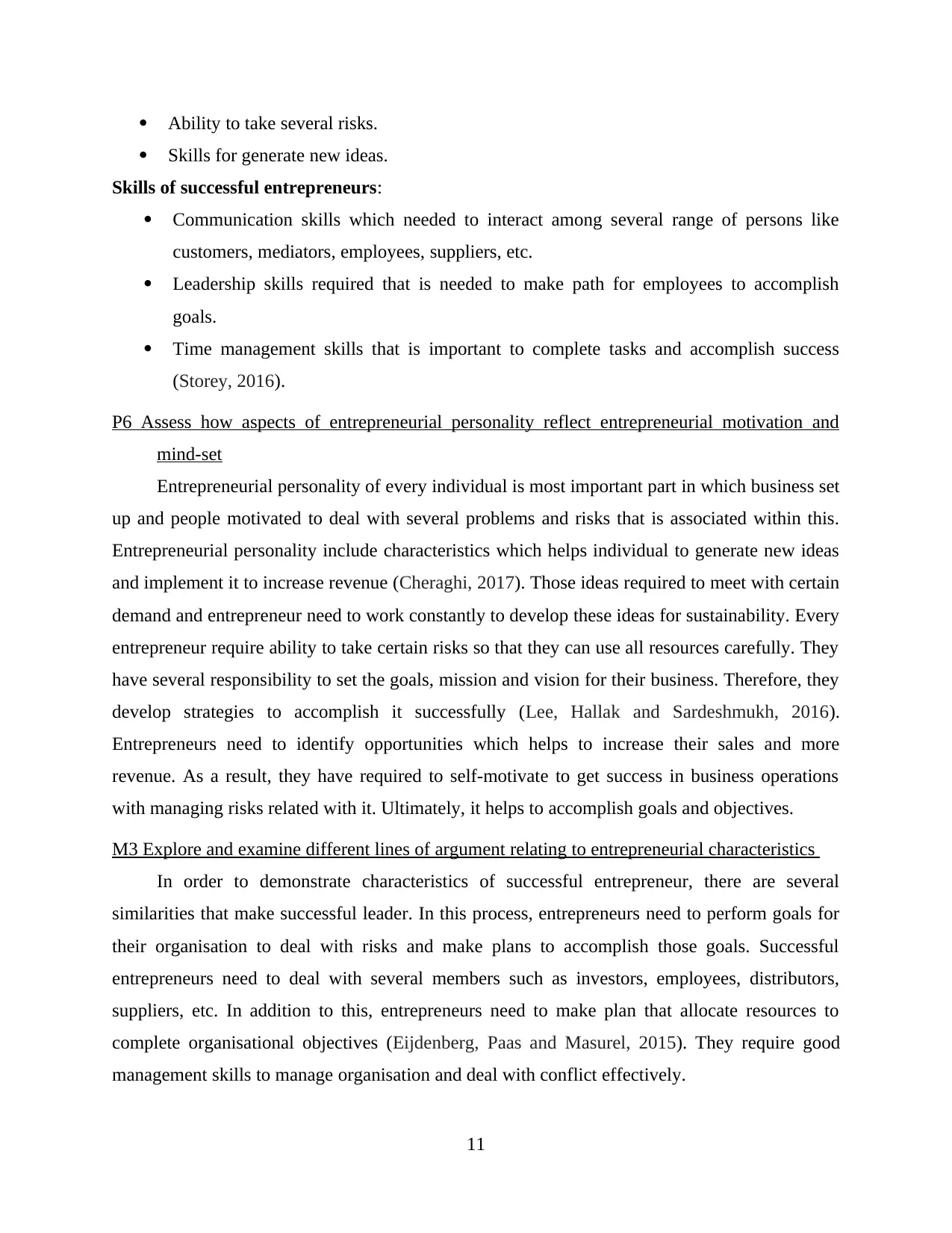
Ability to take several risks.
Skills for generate new ideas.
Skills of successful entrepreneurs:
Communication skills which needed to interact among several range of persons like
customers, mediators, employees, suppliers, etc.
Leadership skills required that is needed to make path for employees to accomplish
goals.
Time management skills that is important to complete tasks and accomplish success
(Storey, 2016).
P6 Assess how aspects of entrepreneurial personality reflect entrepreneurial motivation and
mind-set
Entrepreneurial personality of every individual is most important part in which business set
up and people motivated to deal with several problems and risks that is associated within this.
Entrepreneurial personality include characteristics which helps individual to generate new ideas
and implement it to increase revenue (Cheraghi, 2017). Those ideas required to meet with certain
demand and entrepreneur need to work constantly to develop these ideas for sustainability. Every
entrepreneur require ability to take certain risks so that they can use all resources carefully. They
have several responsibility to set the goals, mission and vision for their business. Therefore, they
develop strategies to accomplish it successfully (Lee, Hallak and Sardeshmukh, 2016).
Entrepreneurs need to identify opportunities which helps to increase their sales and more
revenue. As a result, they have required to self-motivate to get success in business operations
with managing risks related with it. Ultimately, it helps to accomplish goals and objectives.
M3 Explore and examine different lines of argument relating to entrepreneurial characteristics
In order to demonstrate characteristics of successful entrepreneur, there are several
similarities that make successful leader. In this process, entrepreneurs need to perform goals for
their organisation to deal with risks and make plans to accomplish those goals. Successful
entrepreneurs need to deal with several members such as investors, employees, distributors,
suppliers, etc. In addition to this, entrepreneurs need to make plan that allocate resources to
complete organisational objectives (Eijdenberg, Paas and Masurel, 2015). They require good
management skills to manage organisation and deal with conflict effectively.
11
Skills for generate new ideas.
Skills of successful entrepreneurs:
Communication skills which needed to interact among several range of persons like
customers, mediators, employees, suppliers, etc.
Leadership skills required that is needed to make path for employees to accomplish
goals.
Time management skills that is important to complete tasks and accomplish success
(Storey, 2016).
P6 Assess how aspects of entrepreneurial personality reflect entrepreneurial motivation and
mind-set
Entrepreneurial personality of every individual is most important part in which business set
up and people motivated to deal with several problems and risks that is associated within this.
Entrepreneurial personality include characteristics which helps individual to generate new ideas
and implement it to increase revenue (Cheraghi, 2017). Those ideas required to meet with certain
demand and entrepreneur need to work constantly to develop these ideas for sustainability. Every
entrepreneur require ability to take certain risks so that they can use all resources carefully. They
have several responsibility to set the goals, mission and vision for their business. Therefore, they
develop strategies to accomplish it successfully (Lee, Hallak and Sardeshmukh, 2016).
Entrepreneurs need to identify opportunities which helps to increase their sales and more
revenue. As a result, they have required to self-motivate to get success in business operations
with managing risks related with it. Ultimately, it helps to accomplish goals and objectives.
M3 Explore and examine different lines of argument relating to entrepreneurial characteristics
In order to demonstrate characteristics of successful entrepreneur, there are several
similarities that make successful leader. In this process, entrepreneurs need to perform goals for
their organisation to deal with risks and make plans to accomplish those goals. Successful
entrepreneurs need to deal with several members such as investors, employees, distributors,
suppliers, etc. In addition to this, entrepreneurs need to make plan that allocate resources to
complete organisational objectives (Eijdenberg, Paas and Masurel, 2015). They require good
management skills to manage organisation and deal with conflict effectively.
11
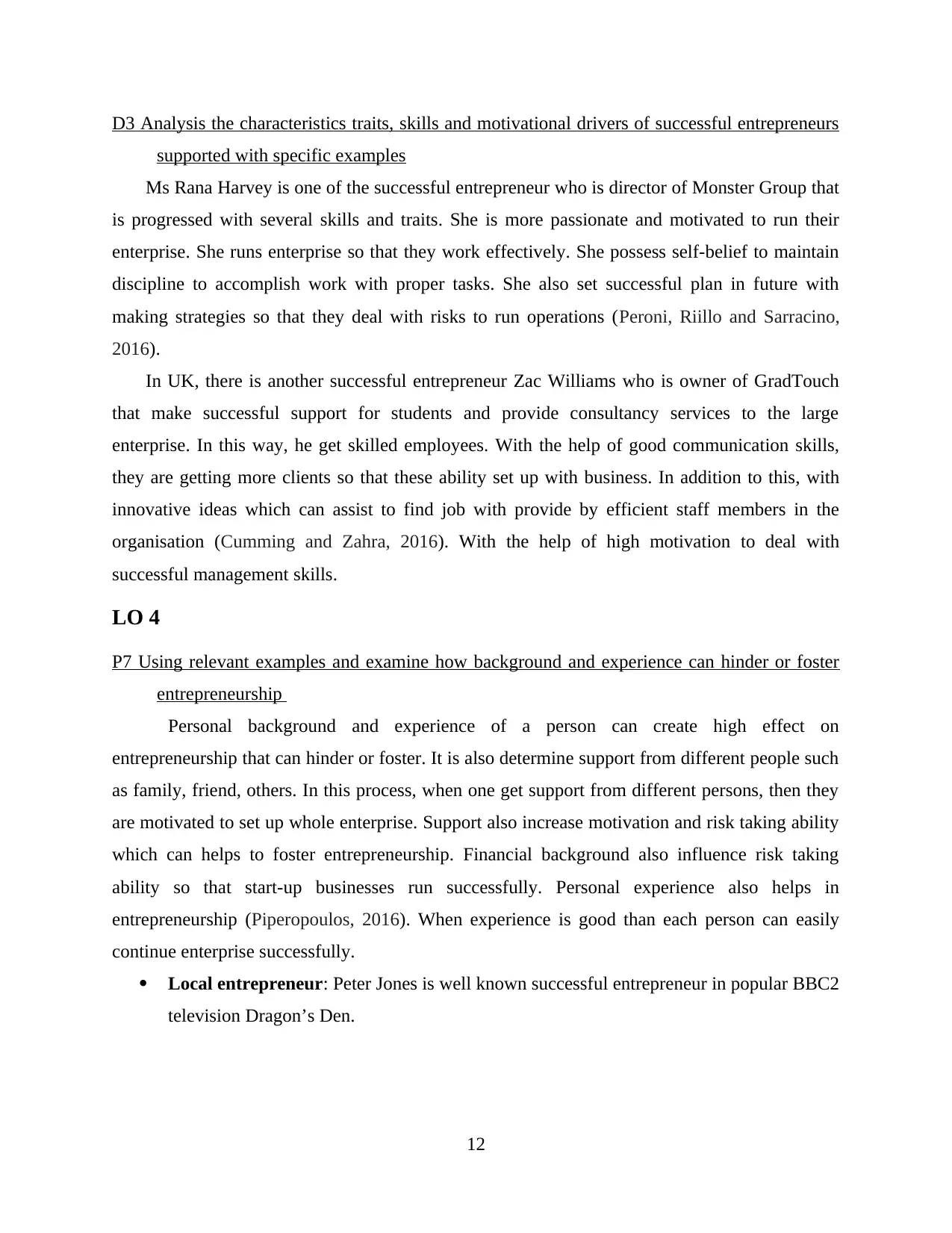
D3 Analysis the characteristics traits, skills and motivational drivers of successful entrepreneurs
supported with specific examples
Ms Rana Harvey is one of the successful entrepreneur who is director of Monster Group that
is progressed with several skills and traits. She is more passionate and motivated to run their
enterprise. She runs enterprise so that they work effectively. She possess self-belief to maintain
discipline to accomplish work with proper tasks. She also set successful plan in future with
making strategies so that they deal with risks to run operations (Peroni, Riillo and Sarracino,
2016).
In UK, there is another successful entrepreneur Zac Williams who is owner of GradTouch
that make successful support for students and provide consultancy services to the large
enterprise. In this way, he get skilled employees. With the help of good communication skills,
they are getting more clients so that these ability set up with business. In addition to this, with
innovative ideas which can assist to find job with provide by efficient staff members in the
organisation (Cumming and Zahra, 2016). With the help of high motivation to deal with
successful management skills.
LO 4
P7 Using relevant examples and examine how background and experience can hinder or foster
entrepreneurship
Personal background and experience of a person can create high effect on
entrepreneurship that can hinder or foster. It is also determine support from different people such
as family, friend, others. In this process, when one get support from different persons, then they
are motivated to set up whole enterprise. Support also increase motivation and risk taking ability
which can helps to foster entrepreneurship. Financial background also influence risk taking
ability so that start-up businesses run successfully. Personal experience also helps in
entrepreneurship (Piperopoulos, 2016). When experience is good than each person can easily
continue enterprise successfully.
Local entrepreneur: Peter Jones is well known successful entrepreneur in popular BBC2
television Dragon’s Den.
12
supported with specific examples
Ms Rana Harvey is one of the successful entrepreneur who is director of Monster Group that
is progressed with several skills and traits. She is more passionate and motivated to run their
enterprise. She runs enterprise so that they work effectively. She possess self-belief to maintain
discipline to accomplish work with proper tasks. She also set successful plan in future with
making strategies so that they deal with risks to run operations (Peroni, Riillo and Sarracino,
2016).
In UK, there is another successful entrepreneur Zac Williams who is owner of GradTouch
that make successful support for students and provide consultancy services to the large
enterprise. In this way, he get skilled employees. With the help of good communication skills,
they are getting more clients so that these ability set up with business. In addition to this, with
innovative ideas which can assist to find job with provide by efficient staff members in the
organisation (Cumming and Zahra, 2016). With the help of high motivation to deal with
successful management skills.
LO 4
P7 Using relevant examples and examine how background and experience can hinder or foster
entrepreneurship
Personal background and experience of a person can create high effect on
entrepreneurship that can hinder or foster. It is also determine support from different people such
as family, friend, others. In this process, when one get support from different persons, then they
are motivated to set up whole enterprise. Support also increase motivation and risk taking ability
which can helps to foster entrepreneurship. Financial background also influence risk taking
ability so that start-up businesses run successfully. Personal experience also helps in
entrepreneurship (Piperopoulos, 2016). When experience is good than each person can easily
continue enterprise successfully.
Local entrepreneur: Peter Jones is well known successful entrepreneur in popular BBC2
television Dragon’s Den.
12
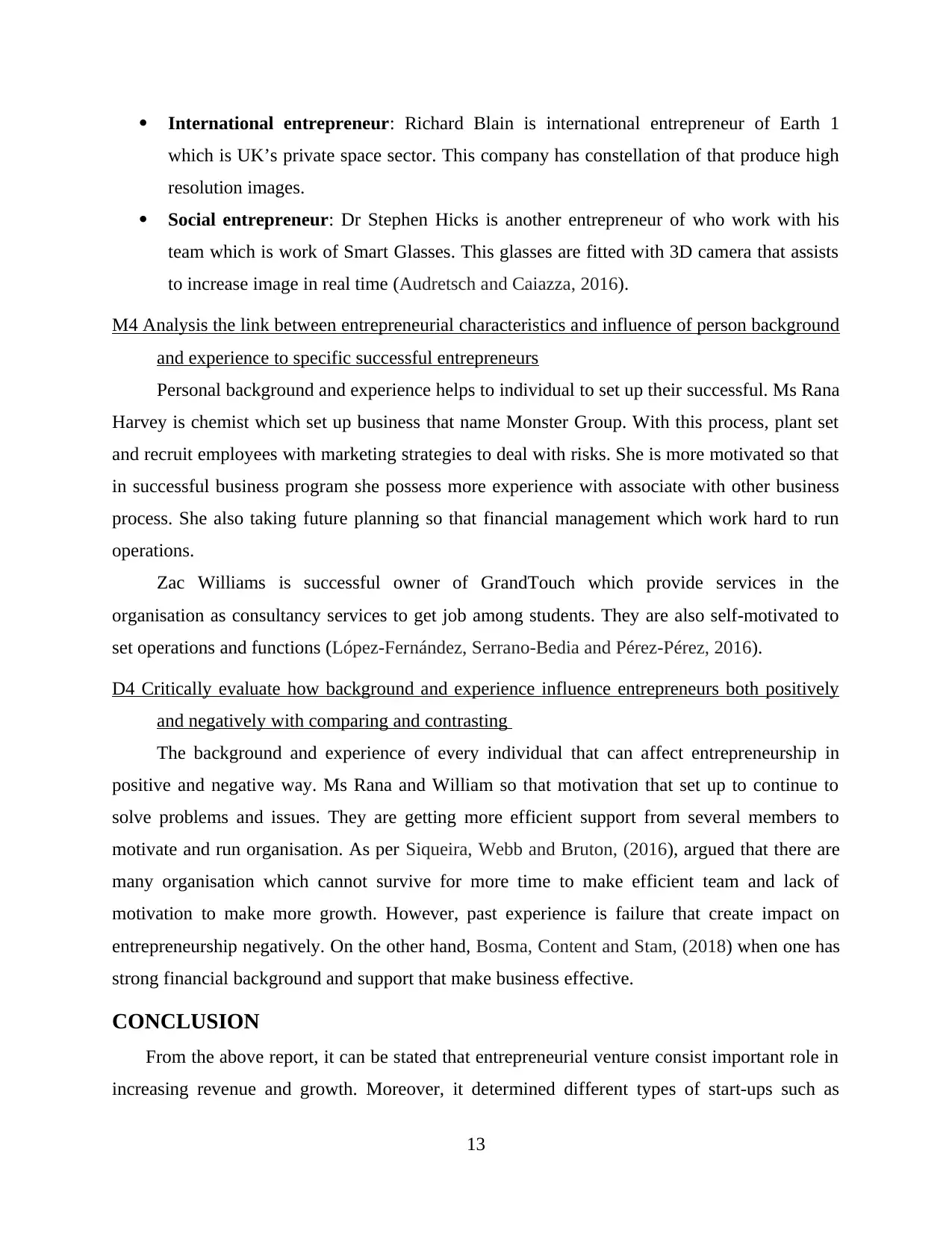
International entrepreneur: Richard Blain is international entrepreneur of Earth 1
which is UK’s private space sector. This company has constellation of that produce high
resolution images.
Social entrepreneur: Dr Stephen Hicks is another entrepreneur of who work with his
team which is work of Smart Glasses. This glasses are fitted with 3D camera that assists
to increase image in real time (Audretsch and Caiazza, 2016).
M4 Analysis the link between entrepreneurial characteristics and influence of person background
and experience to specific successful entrepreneurs
Personal background and experience helps to individual to set up their successful. Ms Rana
Harvey is chemist which set up business that name Monster Group. With this process, plant set
and recruit employees with marketing strategies to deal with risks. She is more motivated so that
in successful business program she possess more experience with associate with other business
process. She also taking future planning so that financial management which work hard to run
operations.
Zac Williams is successful owner of GrandTouch which provide services in the
organisation as consultancy services to get job among students. They are also self-motivated to
set operations and functions (López‐Fernández, Serrano‐Bedia and Pérez‐Pérez, 2016).
D4 Critically evaluate how background and experience influence entrepreneurs both positively
and negatively with comparing and contrasting
The background and experience of every individual that can affect entrepreneurship in
positive and negative way. Ms Rana and William so that motivation that set up to continue to
solve problems and issues. They are getting more efficient support from several members to
motivate and run organisation. As per Siqueira, Webb and Bruton, (2016), argued that there are
many organisation which cannot survive for more time to make efficient team and lack of
motivation to make more growth. However, past experience is failure that create impact on
entrepreneurship negatively. On the other hand, Bosma, Content and Stam, (2018) when one has
strong financial background and support that make business effective.
CONCLUSION
From the above report, it can be stated that entrepreneurial venture consist important role in
increasing revenue and growth. Moreover, it determined different types of start-ups such as
13
which is UK’s private space sector. This company has constellation of that produce high
resolution images.
Social entrepreneur: Dr Stephen Hicks is another entrepreneur of who work with his
team which is work of Smart Glasses. This glasses are fitted with 3D camera that assists
to increase image in real time (Audretsch and Caiazza, 2016).
M4 Analysis the link between entrepreneurial characteristics and influence of person background
and experience to specific successful entrepreneurs
Personal background and experience helps to individual to set up their successful. Ms Rana
Harvey is chemist which set up business that name Monster Group. With this process, plant set
and recruit employees with marketing strategies to deal with risks. She is more motivated so that
in successful business program she possess more experience with associate with other business
process. She also taking future planning so that financial management which work hard to run
operations.
Zac Williams is successful owner of GrandTouch which provide services in the
organisation as consultancy services to get job among students. They are also self-motivated to
set operations and functions (López‐Fernández, Serrano‐Bedia and Pérez‐Pérez, 2016).
D4 Critically evaluate how background and experience influence entrepreneurs both positively
and negatively with comparing and contrasting
The background and experience of every individual that can affect entrepreneurship in
positive and negative way. Ms Rana and William so that motivation that set up to continue to
solve problems and issues. They are getting more efficient support from several members to
motivate and run organisation. As per Siqueira, Webb and Bruton, (2016), argued that there are
many organisation which cannot survive for more time to make efficient team and lack of
motivation to make more growth. However, past experience is failure that create impact on
entrepreneurship negatively. On the other hand, Bosma, Content and Stam, (2018) when one has
strong financial background and support that make business effective.
CONCLUSION
From the above report, it can be stated that entrepreneurial venture consist important role in
increasing revenue and growth. Moreover, it determined different types of start-ups such as
13
Secure Best Marks with AI Grader
Need help grading? Try our AI Grader for instant feedback on your assignments.

micro, medium and many others. Furthermore, it summarised about there is more participation of
micro and start-ups. In this regard, there is major contribution of small and medium enterprise
assist to contribute larger part in creating value. In addition to this, larger businesses considered
several operational activities so that they employ several number of candidates. Along with this,
it articulated about characteristics traits and skills of successful entrepreneurs.
14
micro and start-ups. In this regard, there is major contribution of small and medium enterprise
assist to contribute larger part in creating value. In addition to this, larger businesses considered
several operational activities so that they employ several number of candidates. Along with this,
it articulated about characteristics traits and skills of successful entrepreneurs.
14
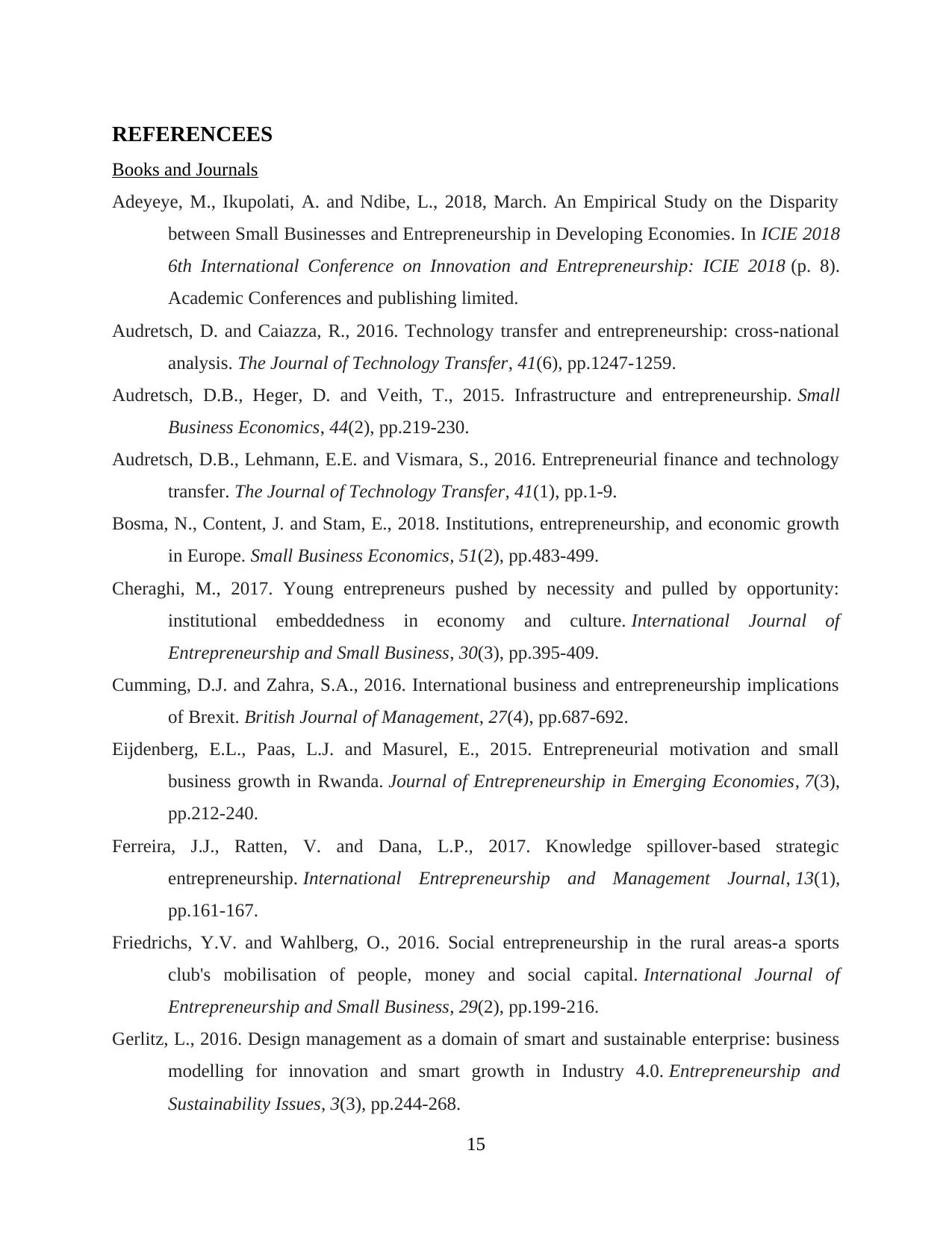
REFERENCEES
Books and Journals
Adeyeye, M., Ikupolati, A. and Ndibe, L., 2018, March. An Empirical Study on the Disparity
between Small Businesses and Entrepreneurship in Developing Economies. In ICIE 2018
6th International Conference on Innovation and Entrepreneurship: ICIE 2018 (p. 8).
Academic Conferences and publishing limited.
Audretsch, D. and Caiazza, R., 2016. Technology transfer and entrepreneurship: cross-national
analysis. The Journal of Technology Transfer, 41(6), pp.1247-1259.
Audretsch, D.B., Heger, D. and Veith, T., 2015. Infrastructure and entrepreneurship. Small
Business Economics, 44(2), pp.219-230.
Audretsch, D.B., Lehmann, E.E. and Vismara, S., 2016. Entrepreneurial finance and technology
transfer. The Journal of Technology Transfer, 41(1), pp.1-9.
Bosma, N., Content, J. and Stam, E., 2018. Institutions, entrepreneurship, and economic growth
in Europe. Small Business Economics, 51(2), pp.483-499.
Cheraghi, M., 2017. Young entrepreneurs pushed by necessity and pulled by opportunity:
institutional embeddedness in economy and culture. International Journal of
Entrepreneurship and Small Business, 30(3), pp.395-409.
Cumming, D.J. and Zahra, S.A., 2016. International business and entrepreneurship implications
of Brexit. British Journal of Management, 27(4), pp.687-692.
Eijdenberg, E.L., Paas, L.J. and Masurel, E., 2015. Entrepreneurial motivation and small
business growth in Rwanda. Journal of Entrepreneurship in Emerging Economies, 7(3),
pp.212-240.
Ferreira, J.J., Ratten, V. and Dana, L.P., 2017. Knowledge spillover-based strategic
entrepreneurship. International Entrepreneurship and Management Journal, 13(1),
pp.161-167.
Friedrichs, Y.V. and Wahlberg, O., 2016. Social entrepreneurship in the rural areas-a sports
club's mobilisation of people, money and social capital. International Journal of
Entrepreneurship and Small Business, 29(2), pp.199-216.
Gerlitz, L., 2016. Design management as a domain of smart and sustainable enterprise: business
modelling for innovation and smart growth in Industry 4.0. Entrepreneurship and
Sustainability Issues, 3(3), pp.244-268.
15
Books and Journals
Adeyeye, M., Ikupolati, A. and Ndibe, L., 2018, March. An Empirical Study on the Disparity
between Small Businesses and Entrepreneurship in Developing Economies. In ICIE 2018
6th International Conference on Innovation and Entrepreneurship: ICIE 2018 (p. 8).
Academic Conferences and publishing limited.
Audretsch, D. and Caiazza, R., 2016. Technology transfer and entrepreneurship: cross-national
analysis. The Journal of Technology Transfer, 41(6), pp.1247-1259.
Audretsch, D.B., Heger, D. and Veith, T., 2015. Infrastructure and entrepreneurship. Small
Business Economics, 44(2), pp.219-230.
Audretsch, D.B., Lehmann, E.E. and Vismara, S., 2016. Entrepreneurial finance and technology
transfer. The Journal of Technology Transfer, 41(1), pp.1-9.
Bosma, N., Content, J. and Stam, E., 2018. Institutions, entrepreneurship, and economic growth
in Europe. Small Business Economics, 51(2), pp.483-499.
Cheraghi, M., 2017. Young entrepreneurs pushed by necessity and pulled by opportunity:
institutional embeddedness in economy and culture. International Journal of
Entrepreneurship and Small Business, 30(3), pp.395-409.
Cumming, D.J. and Zahra, S.A., 2016. International business and entrepreneurship implications
of Brexit. British Journal of Management, 27(4), pp.687-692.
Eijdenberg, E.L., Paas, L.J. and Masurel, E., 2015. Entrepreneurial motivation and small
business growth in Rwanda. Journal of Entrepreneurship in Emerging Economies, 7(3),
pp.212-240.
Ferreira, J.J., Ratten, V. and Dana, L.P., 2017. Knowledge spillover-based strategic
entrepreneurship. International Entrepreneurship and Management Journal, 13(1),
pp.161-167.
Friedrichs, Y.V. and Wahlberg, O., 2016. Social entrepreneurship in the rural areas-a sports
club's mobilisation of people, money and social capital. International Journal of
Entrepreneurship and Small Business, 29(2), pp.199-216.
Gerlitz, L., 2016. Design management as a domain of smart and sustainable enterprise: business
modelling for innovation and smart growth in Industry 4.0. Entrepreneurship and
Sustainability Issues, 3(3), pp.244-268.
15
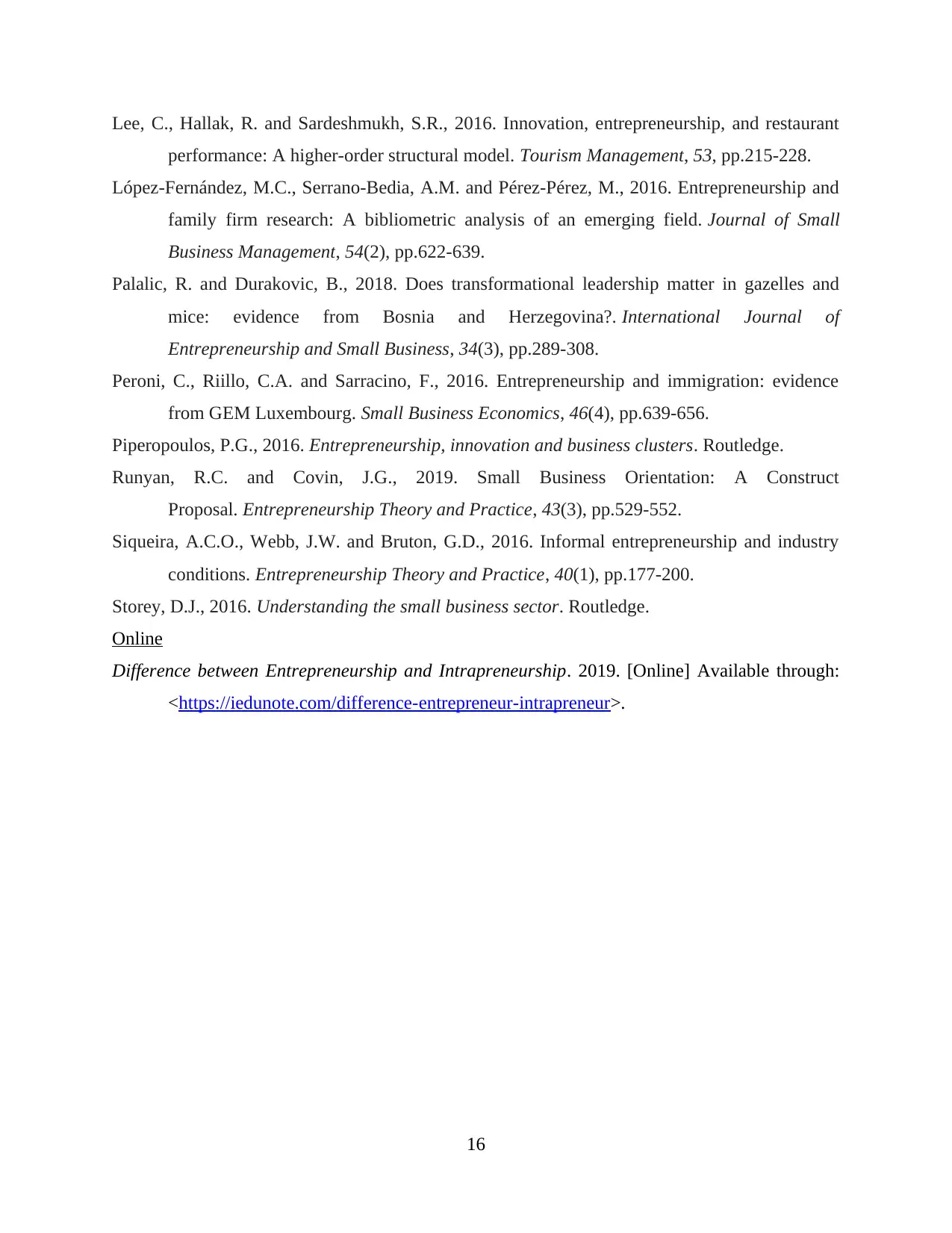
Lee, C., Hallak, R. and Sardeshmukh, S.R., 2016. Innovation, entrepreneurship, and restaurant
performance: A higher-order structural model. Tourism Management, 53, pp.215-228.
López‐Fernández, M.C., Serrano‐Bedia, A.M. and Pérez‐Pérez, M., 2016. Entrepreneurship and
family firm research: A bibliometric analysis of an emerging field. Journal of Small
Business Management, 54(2), pp.622-639.
Palalic, R. and Durakovic, B., 2018. Does transformational leadership matter in gazelles and
mice: evidence from Bosnia and Herzegovina?. International Journal of
Entrepreneurship and Small Business, 34(3), pp.289-308.
Peroni, C., Riillo, C.A. and Sarracino, F., 2016. Entrepreneurship and immigration: evidence
from GEM Luxembourg. Small Business Economics, 46(4), pp.639-656.
Piperopoulos, P.G., 2016. Entrepreneurship, innovation and business clusters. Routledge.
Runyan, R.C. and Covin, J.G., 2019. Small Business Orientation: A Construct
Proposal. Entrepreneurship Theory and Practice, 43(3), pp.529-552.
Siqueira, A.C.O., Webb, J.W. and Bruton, G.D., 2016. Informal entrepreneurship and industry
conditions. Entrepreneurship Theory and Practice, 40(1), pp.177-200.
Storey, D.J., 2016. Understanding the small business sector. Routledge.
Online
Difference between Entrepreneurship and Intrapreneurship. 2019. [Online] Available through:
<https://iedunote.com/difference-entrepreneur-intrapreneur>.
16
performance: A higher-order structural model. Tourism Management, 53, pp.215-228.
López‐Fernández, M.C., Serrano‐Bedia, A.M. and Pérez‐Pérez, M., 2016. Entrepreneurship and
family firm research: A bibliometric analysis of an emerging field. Journal of Small
Business Management, 54(2), pp.622-639.
Palalic, R. and Durakovic, B., 2018. Does transformational leadership matter in gazelles and
mice: evidence from Bosnia and Herzegovina?. International Journal of
Entrepreneurship and Small Business, 34(3), pp.289-308.
Peroni, C., Riillo, C.A. and Sarracino, F., 2016. Entrepreneurship and immigration: evidence
from GEM Luxembourg. Small Business Economics, 46(4), pp.639-656.
Piperopoulos, P.G., 2016. Entrepreneurship, innovation and business clusters. Routledge.
Runyan, R.C. and Covin, J.G., 2019. Small Business Orientation: A Construct
Proposal. Entrepreneurship Theory and Practice, 43(3), pp.529-552.
Siqueira, A.C.O., Webb, J.W. and Bruton, G.D., 2016. Informal entrepreneurship and industry
conditions. Entrepreneurship Theory and Practice, 40(1), pp.177-200.
Storey, D.J., 2016. Understanding the small business sector. Routledge.
Online
Difference between Entrepreneurship and Intrapreneurship. 2019. [Online] Available through:
<https://iedunote.com/difference-entrepreneur-intrapreneur>.
16
1 out of 19
Related Documents
Your All-in-One AI-Powered Toolkit for Academic Success.
+13062052269
info@desklib.com
Available 24*7 on WhatsApp / Email
![[object Object]](/_next/static/media/star-bottom.7253800d.svg)
Unlock your academic potential
© 2024 | Zucol Services PVT LTD | All rights reserved.





